#and i feel like bartleby because I WOULD PREFER NOT TO
Text
I feel like a character in a Herman Melville short story. Except that he never writes women so that’s not even accurate
#feel free to correct me if i’m fucking wrong. considering that i’ve only read bartleby the scrivener; a quarter of moby dick;#and like 2 other stories and i don’t remember any women#i am feeling like. the main dude in bartleby who is dealing with bartleby. and i am also feeling like bartleby himself#i’m trying to cancel this fucking wine club subscription and the company aren’t responding to any of my emails but they keep calling me#and i can’t answer the phone because i can’t get a signal because they’re doing work on the o2 mast#i just see the missed calls in my log and i’m like. it didn’t even ring. how do you Know#i’m emailing them like ‘i can’t answer the phone; just answer my emails if you want to talk. you’re clearly reading them or you wouldn’t be#calling me’ and every day like clockwork they call me around 2pm. it’s starting to make me insane#yes i could call them from a landline but it’s the principle of the fucking thing. just CANCEL IT online. i have sent no fewer than four#emails. they haven’t responded to a single one#i told my credit card company not to let them take money from me because it would be fraudulent because i did not consent to this#subscription and they were like ‘right-o chief’ and i was like ‘is there anything i can do if they send me a product and try to charge me#for it? i don’t want anything from them AND i don’t want to be liable for payment’ and they were like ‘we can send you a new card if that#happens’ cool thanks. i guess my problems are not their problems so it makes sense#and my dog is legitimately going senile. she’s just pacing and looking at me#and i don’t know how to do my homework and i’m pretty close to a breakdown because everyone’s acting like it’s super easy to get eleventy#working but it’s literally not and it’s fucking me up because if i can’t do this assignment then i can’t do like 3 other assignments either#and i’m already behind and i’m going to be even more behind by the time my midterm takes place in two weeks#and i feel like bartleby because I WOULD PREFER NOT TO#i feel like i’m losing my mind. my sister just died and i don’t know how or why and we didn’t talk but it’s still fucked up#and her funeral is tomorrow and i’m not going and i don’t think that’s right? but i can’t#i legitimately feel like i’m having a breakdown and i don’t have TIME to have a breakdown#and i have no food in the house and i need to help my friend write a victim statement again because she’s reporting him for something ELSE#he did. and we love to see it but gooooood fucking lord#and i am cold. and mabel is staring at me#and i’m pretty sure i’m going to get my period in 3 days or less#october you really know how to break a woman down to her bare essentials#personal
0 notes
Text
Blaseball is dead.
here's an article I wrote about one wild incident of emergent narrative weirdness, an at-bat where a little frog refused to stop swinging at pitches and locked up the entire engine for a while.
oh and also the Herman Melville story Bartleby the Scrivener. it's about that too.
as Blaseball wraps up, and in the face of a few pretty disappointing years of collapsing fan-driven projects like it, I'm feeling a lot of the ambivalence that comes late in the piece:
Characters like Bartleby and Chorby appeal to me because they represent a disruption, a suggestion that things can be different than they are if we simply... well, not "stop playing by the rules", exactly. After all, nothing here was against the rules, it emerged from the rules themselves, and the force of Chorby's and PolkaDot's natures colliding together. No, this was malicious compliance, carrying out orders to the letter of the law, behaving like a silly little automaton, doing exactly what the boss says even when doing so would obviously result in disaster.
This kind of thing doesn't necessarily work out for the maliciously compliant. Sorry for the spoilers for a century-and-a-half-old story but Bartleby ultimately dies in poverty. The Magic did not win the game in which Chorby carried out her heroic string of foul balls.
I guess it's hard for me not to look at the postmodernists like Slavoj Zizek for whom Bartleby is an iconic figure, and look at the kind of "leaderless" and "demandless" movements driven by ambient refusal that they championed, and not feel like just refusal and random malicious compliance don't make for a particularly sustainable movement. by the same token, The Game Band seems to have really tried to operate their company differently, to opt out of some of the business practices that we all kind of hate the game industry for employing. a live service game that doesn't include a form of gambling with real money? a franchise that encourages fans to produce their own merch? wow! then later: ah, well, nevertheless.
it makes me think of a bit in Graber's Utopia of Rules where he describes the difficulties of an anarchist house collectively owning a car, and how they come not from anything as obvious as scheduling, but from figuring out how to define that collective ownership within a legal state framework that assumes one person's name will be on the insurance. it seems difficult to build a new world parasitically inside of, and from the matter, of the old.
RIV Blaseball.
74 notes
·
View notes
Text
Manic T. Hedgehog is Canonically GNC/Nonbinary
Please note that I'm not a Sonic expert and I didn't feel like scrubbing through the whole show for screencaps, so most of these are from the same four episodes.
1. From So This is Basically Sonic the Hedgehog: "The boys wear shoes and the girls wear entire outfits." This is true across pretty much all media. Some characters have goggles, a hat, and/or a bandana, but otherwise everyone follows this rule. Except the drummer. Manic wears half an outfit.

That's shoes and gloves (gender-conforming boys mostly have gloves, too) but also bracelets, earrings, a bag, and a vest. I'm not going to count jewelry, but no other masc-aligned character covers that much skin in thier regular outfit. The earrings seem to be unique among Sonic characters, though. It's worth noting, but not immediately relavent, that he has a double helix in his left ear.


While we're on the subject of clothing preferences, let's talk about Wedding Bell Blues. Now, it's possible he could be secure enough in his masculinity to be Little Bo Peep, but that doesn't explain the attitude or how quickly he suggested disguising himself as his own mother in the first place.

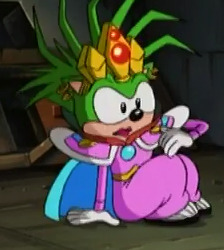
Look at the elation in those eyes. The disgust at being thrown to the ground. The poise and grace. The fact that apparently both ears are pierced, but he only wears the two earrings most of the time. And he didn't have to go all the way. The lipstick isn't necessary for the disguise. But it is a good segue to point two.
2. You know how Sonia wears mascara (or at least has eyelashes)? And Sonic just has eyelids?






Sonic's eyelids always stop before the edge of his eye. Even when they draw the line a little thicker, it never extends outside of the eye itself. Manic's frequently (not always) flicks out at the end when he blinks. You'd think it would happen equally to both of them if it was just a mistake. And while I have these pictures here, I need you to stop and look at how fucking cute Manic is. This hedgehog slays.
3. Sonia's voice is "girl", Sonic's voice is "boy", and Manic's voice is "sassy". I want to describe it as valley girl/surfer dude. They could have had a Brooklyn accent or used different slang and filler words, but they, like, always go for "like." That's way more valley girl than it ever was surfer dude. You'll notice that they use "dude" as a descriptor and an interjection, but they usually reserve "bro" for when they're actually referring to Sonic. It's not just the dialect, either, because that could be a learned behavior they picked up in the streets. Half of it is their tone. Even Sonic, who is famous for being snarky, doesn't swing his hips and strut the way Manic does.
4. Look at the way this hedgehog stands, especially as compared to Sonic in the same situations.

The confidence.

The attitude.
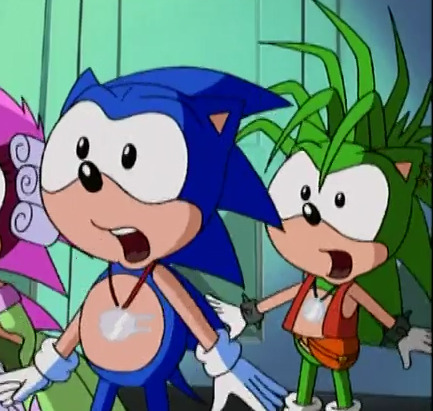
The lean back.


The dainty way they hold their hands. That's not a traditional drummer's grip. That's a sassy drummer's grip.
5. There are no gender lines in punk. Sonic is basic, Sonia is posh, and Manic dresses like someone who would flip Sleet off for calling them a slur. Not that Sleet would. Look at that cape.
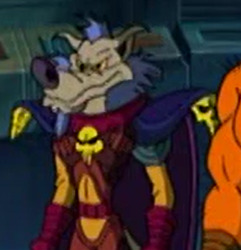
6. Sonic's hair goes back. Sonia's hair goes forward. Trevor's hair goes back and down. Manic's hair goes up and forward.




It looks like Sonia's hair, but spiky.
7. In general, masculine and feminine characters in the Sonic franchise have roughly the same shoe size. In Underground, feminine, dainty characters like Sonia and Bartleby have smaller feet.
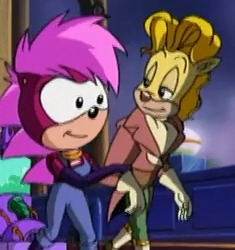
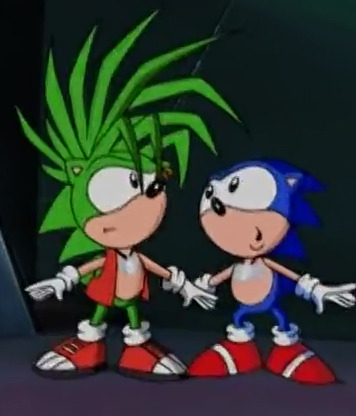
Manic's feet look smaller than Sonic's, but only by a hair. It's actually mostly an illusion. Their feet are the same proportion of their bodies and are drawn to be the same size when they're standing on the same plane. But something about them makes Manic's shoes look smaller in most shots.
Now, you might notice that some of these trends remind you of another Sonic character. Full outfit, smaller feet, overdramatic stance, highly expressive tone and word choice...
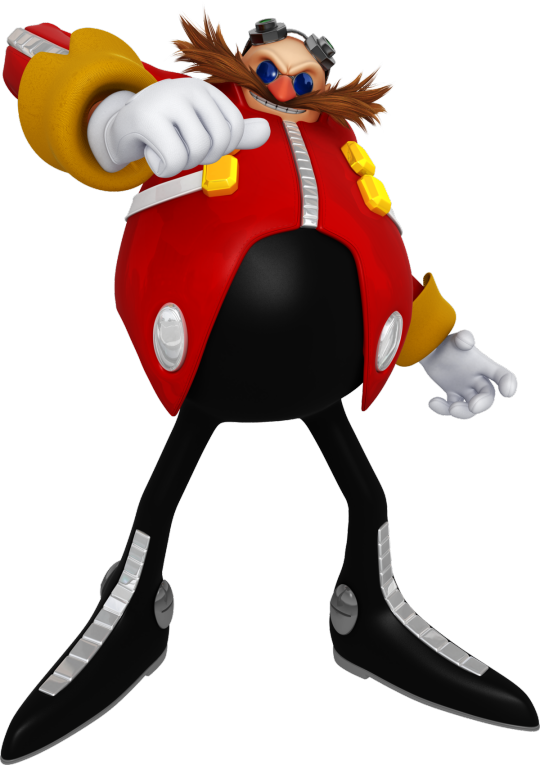
#sonic fandom#sonic underground#manic the hedgehog#gnc#nonbinary#sonic headcanons#theory#headcanon#sonic theory#image heavy#i spent way too long on this#hear me out#i think about this a lot#dr robotnik
13 notes
·
View notes
Text

✦ C U C U F A T E ✦ CHARACTER PROFILE
Cucufate is Altaluna's (the protagonist) main ally in The Sorcerer’s Apprentice. Under the cut, you’ll find his complete profile! *I'll update this page as I come up with new details.
TAG LIST: (ask to be + or - ) @the-finch-address @achilleanmafia @fearofahumanplanet @winterninja-fr@avrablake @iced-ginger-tea @wildswrites @tate-lin @outpost51 @d3mon-ology @hippiewrites @threeking @lexiklecksi
I D - CARD
✦ Full Name: Cucufate or Cucuphas (I borrowed the name from the patron saint of petty thieves and kyphosis). Pronounced: "cook - ooo (as in "goo") - fa (as in "fa-la-la-la-la") - te (as in "telephone").
✦ Age: Unknown
✦ Sex & Gender: Irrelevant, but I'm thinking male?
✦ Physical Description: Cucufate is a culpeo, a South American canid otherwise known as a Paramo Wolf or Andean Fox (although it bears a striking resemblance to the red fox, it's actually more closely related to wolves and coyotes).
✦ Occupation: One of Valeriano's Abandoned Projects.
INSPIRATION
✦ Socrates & Bartleby: (*I'm in the process of rewriting this section, as it isn't very clear. Thanks for your patience!) Cucufate is based on two figures: the ancient philosopher Socrates and Bartleby from the short story Bartleby, The Scrivener by Herman Melville. What I wanted to do with Cucufate was find a way to have an animal speak without necessarily resorting to a 'human' voice (a voice that furthers our aims, mimics and thus elevates our culture, clarifies and informs etc.). This is where Socrates and Bartleby enter the picture. They both provide a language model that subverts standard communication.
For instance, despite being the primary character in Plato's Dialogues and one of the most famous philosophers of all time, Socrates makes no positive or prescriptive claims (thou shalt not blah, this is that etc.). Instead, he talks in (flattery &) questions, undermining any certainty his interlocutors might feel by prodding and probing their knowledge of x, y & z until they are forced to reveal their ignorance (this is known as Socratic irony). Socrates' speech is thus a kind of anti-speech. If it spotlights a topic, it does so only to reveal the immensity of the darkness that sustains it, its lack of substance. Indeed, whenever Socrates opens his mouth, he widens the abyss that will eventually swallow his interlocutor's thoughts and beliefs whole, and terminate the discussion (silence). Hence, Socratic dialogue successfully humiliates and confuses us. It strips us of that very human arrogance, our intellectual bravado, so that we too can become wise: so that we too can share in the wisdom of knowing that we don't know. Doesn't the natural world do the same? Isn't that precisely the horror of climate change?
Bartleby, on the other hand, taps into the ambiguity of certain language formulas. His signature phrase "I would prefer not to," which he repeats whenever he's asked to do his job, expresses a hypothetical that... never seems to go anywhere? It's the Schrodinger's Cat of phrases, simultaneously dead and alive; he'd prefer not to, but... will he or won't he? Yes. The ambiguity, the inaction of it, dumfounds and incapacitates his employer. Bartleby's speech thus provides an example of a language that resists, confounds rather than clarifies, and complicates rather than simplifies. Like Socratic irony, Bartleby's masterful use of the conditional and modal auxiliary verb "would," disrupts the status quo. Because Cucufate's speech pattern draws from both of them, he becomes an effective helper to Altaluna; by engaging with her, he counteracts the temptation to think along the lines of a simplistic, "heroic" fascism (good vs. evil, light vs. darkness, us vs. them), and forces her instead to adopt a more nuanced stance, capable of aptly handing contradiction and ambiguity. (*Appropriated from this post).
✦ Cunning Intelligence in Greek Culture and Society by Marcel Detienne & Jean-Pierre Vernant: "When Oppian describes the cunning of the fishing frog squatting in the mud, motionless and invisible, he compares it to the fox: ‘The scheming fox (agkulómetis kerdō) devises a similar trick; as soon as it spots a flock of wild birds it lies down on its side, stretches out its agile limbs, closes its eyelids and shuts its mouth. To see it you would think that it was enjoying a deep sleep or even that it was really dead, so well does it hold its breath as it lies stretched out there, all the while turning over treacherous plots (aióla bouleúousa) in its mind. No sooner do the birds notice it than they swoop down on it in a flock and, as if in mockery, tear at its coat with their claws, but as soon as they are within reach of its teeth the fox reveals its cunning (dólos) and seizes them unexpectedly. The fox is a trap; when the right moment comes the dead creature becomes more alive than the living. [….] If the metis of the fox is immediately detectable in its skill at playing dead, it is dazzlingly apparent in this sudden reversal. In effect, the fox holds the secret of reversal which is the last word in craftiness." (pp. 35-36)
© 2023 The Sorcerer’s Apprentice. All rights reserved.
#WIP: THE SORCERER'S APPRENTICE#writeblr#writeblr community#writers of tumblr#writers on tumblr#wip#writing community#writblr community#wtw community#writblr#writer community#the sorcerer's apprentice#CHARACTER: CUCUFATE
6 notes
·
View notes
Note
What are your ships for your muses? Obviously you like sonamy (good taste op) but anything else?
thank u for the vote of confidence sfjkhgdlfsd. it's sort of a funny question, because i'm famously easy to ship with — acquaintances really are encouraged to forceship with me whenever they want, you will have a 99.9% success rate as long as we're not being weird abt ages. i love romance! let's make it work!! so even if i don't actively ship something, there's a pretty good chance i can and will 100% get behind it once / if i start writing it. also, i sometimes feel like making a ship preference clear signals to others that you're likely to forceship, and i never want anybody to think "ah shit i know rain ships our muses they'll probably be weird." i won't!
still, here goes —
going down the muse list — for amy, i obviously love sonamy. they're cute, i think their relationship is really sweet and unique and lovely. i also really love blazamy and jewelamy! i don't know that i actively ship knuxamy or silvamy in the sense that i'm never going out of my way to find them, but i've written both in the past and really enjoyed it! especially with all three of em getting close over the course of the war. amy just deserves all the love!!
ava really only has one meaningful ship, which is sonava, tho i'm definitely open to others! i think they're fun / have the possibility of being really fun.
yes i like sonelise leave me ALONE sonic is her manic pixie dream hedgehog!!! ROUGE CAN HAVE A HUMAN GIRLFRIEND AND THATS FINE BUT WHEN SONIC ——
whispangle for both tangle and whisper — i mean, they're basically canon. i also really like whispilver and blazangle, though!
shipping surge is a nightmare conceptually but i gotta admit i am a fan of surgeamy, tho i think surge would have a LOT of complexes abt if ames just likes her because she's "another sonic." honestly, surge just needs someone who connects with her and treats her like a person. i'm also kind of into surgesonic conceptually; very unhealthy, but lots of space for fun there? i don't have actual Thoughts abt them aside from like. lmao sonadow but with a heaping helping of 'i have been programmed to give a shit about absolutely nothing except you and hurting you.'
kit developing a tiny 'u are literally the first person in my whole life to be nice to me' crush on tails? who knows, perhaps more likely than u think. i think i do prefer that bond platonically but who knows that could change, either way i do care a lot abt them as besties.
molly x living a long and happy life.
sonia and....fucking knuckles I GUESS??? i think the way sonia would interact with a knuckles who is not a short king dork would be funny. oh and mindy. bartleby im sorry but ur not on the list sonia just gaslit herself into liking you.
rouge! shadouge is important 2 me whether it's platonically or romantically but i do like them romantically. sorry that sonic battle lays it on SO thick and fundamentally rewrote baby me's brain chemistry. i also rly rly like her and wave. thief gfs. AND ROUGE AND TOPAZ OBVIOUSLY. rouge is rly hard to ship tho and def the muse that takes the most plotting
sucre was initially made to ship with sonic when i created her at age 10 or whatever so sonsucre remains. amy, too. god amy would be so good for him.
#obviously im not forcing any ships etc etc#broadly speaking you'll have to approach me to Actually ship#and aside from amys crush on sonic and tangles crushes on whisper and blaze#these dont influence writing generally speaking#answered.#anonymous
3 notes
·
View notes
Text
diary164
2/25-26/2024
sunday - monday
exporting the song again rn.
to be honest i am writing this ahead of midnight but i have thoughts in my head and also, surprisingly, i feel like playing video games. so rn i want to get my thoughts down, check the song, and thennn, idk, maybe play video games...
anyway the thoughts:
today something dumb happened i don't really need to go into, saying something even 'happened' is probably the incorrect read but i am usually too sensitive to what people say and how they say it, it was a discussion about misgendering and i had said "you can misgender a pet it doesn't matter," which is true, i think (i dislike ascribing human features to animals it feels grotesque especially when kindness between you and an animal (any animal, not pets) is founded on material grounds over anything else), but a whole thing came out of it, about misgendering and talking about it in front of me like i have no concept of that, idk, i know my name on discord says 'boy' but i feel like anyone who really knows me (i felt like some of these people should have) would realize that i'm at least not cis, and beyond that indeterminacy, i don't want to say anything. this obviously sucked, i disliked being talked down to, it felt like, but after i showered and looked at it, it just seemed like people wrapped up in complexes that they could not really shed or whatever and had to explain something to not feel, something, idk. i think i am intimately aware of gendering people and so on, it felt less like it really had anything to do w/ me and instead an internal person they invented out of me saying it's no big deal to not know if a cat is a he or a she and maybe it's funny to not know. i dislike being around people so neurotic, i guess, it just agitates. but the thoughts are actually not even like, about the people here, really.
the thoughts came later thinking on the film 'funeral parade of roses,' which is about transfeminine people in japan in 1969, gay culture at that time, there's documentarian moments interspersed, little interviews with the queens (this seems like a good thing to call them) and one in particular says, i am paraphrasing, of herself when asked why she is a "gayboy" (this was the term at the time) and she, not particularly bothered, i recall at least intones something that feels mostly like 'because', unperturbed by the term and feeling herself really, i think, sort of locating herself in the space granted when one is basically dead to the world, where broader sociality would like to dispose of you. this is aspirational to me, that movie speaks to me deeply, in the experiences it describes and its mania, it feels like something in my heart. i do my makeup like eddie, who is referencing twiggy i imagine, with the drawn on lashes. i carry it with me, as part of my face, as much as i can at least, when do makeup. i never want to do any other look. it's odd, maybe. anyhow, this thought collided with the reading i was doing yesterday from tiqqun in cybernetic hypothesis, not the part about panic but the oscillation between perverse enjoyment of one's desires, and then the involuntarism, the quietude and refusal to speak.
"first gesture, i fashion some reality, i disrupt, and i disrupt myself in the same act. all sabotage has its source there. what my behavior represents at that moment does not exist for the apparatus that is sabotaged along with me. neither 0 or 1 i am the absolute third. my pleasure exceeds the capacity of the apparatus. second gesture, i don't respond to the human or machine feedback loops that attempt to encircle me, like bartleby, i "prefer not to," i stand apart, i don't connect, i stay put. i use my passivity as a force against the apparatuses. neither 0 nor 1, i am the absolute nothingness. first phase: i take my pleasure perversely. second phase: i reserve myself."
tiqqun - the cybernetic hypothesis
i feel the quotation makes the connection more evident, but i feel the actor playing eddie, she elucidates this vantage in her speaking/nonspeaking, her existing and the relative quiet of her responses, at least in memory. perhaps i am wrong textually, or in half measures, but there's something here, i am sure of it. i suppose what i am thinking about right now is the gulf i feel between myself and others re: gender, a lot of the time, i don't want to really elucidate it, i don't want to be intelligible, i don't want to submit to what feel like apparatuses made to wrench people who were for long periods of history, decided to be decadent and deathly, corpses out of the ground, put back into circulation of discourses, every voice will be heard, every voice will speak. a transparency which asks us to confess, the cybernetic forces as an inquisition which ask a conforming to a certain kind of reason. idk, maybe this is too harsh on the people i know, i imagine they'd all basically agree with me, is the thing, but i feel so outside them, i don't engage how they do, i am here, and they are on the other side of something. it feels like their response to me talking about animals, was to revive discourse, or to invent it, and use the mode of discourse, platitudes drawn to maximal length, to lose all meaning but carry much weight, stones of language, the form/gesture itself more meaningful than the content, a method of production, i guess. it all comes down to methods of production, language is production, and for them if i was being 'nihilistic' by saying you could ignore a cat's gender (it has none, it conceives of itself, if it does, as a line passing over history, from meals to beds, from sunlight to elsewhere, and pain and the absence of pain, no subjectivity but the being there a center between many pulsions at any point in time, and needing to decide what it will do), i was being insensitive to meaning, i suppose, i did not mean to be, i care about not hurting people's feelings, i never would really, it just bothers me. i am othered, perpetually, any time i feel like i am speaking loosely. are others so afraid to be loose that they tether themselves to discourse so as to keep themselves, i suppose, holy, clean, pure, and moral? is that all it is. it is strange. no one said anything to me, i was condescended to, it felt like, while at once being ignored, a discourse sprung up beside me and ignored me. this made it more intolerable.
anyway.. i am going to game. i want to use a character i played a lot in elden ring and respec them and remake their face into like, something cute. and cute outfits and stuff or whatever. or idk, it might be better to do a character that needs to go do things.
there was a third char that was like, where i needed them to be, i went and killed the boss you have to kill to access the new areas, when that comes out, in like, 4 months. the boss gave me trouble my first go around but he was way easier this time w/ this build. i forgot that i kind of created a demented caster/sword build, it's a little over powered, which is good tbh, cuz i am bad at video games, basically.
i also did make my character cuter, and change their outfit and name and stuff, that kind of thing is really nice for me, idk why. it's scary looking at what people get up to w/ the sliders tbh, sometimes i look to see how to like, make something look more human, and then i see people kind of making weirdly, idk, it feels oddly sexual, in ways that baffle me.
anyway, outside of playing a video game too much today, what else is there, rn i am re-exporting the problem song, trying to un-dip some of the mids in the main guitar sounds to see if they'll become more present/sound a little less, idk, dead? it's weird, how they sound, it's so close, so far, sad but not frustrating rn.
playing a souls game is so strange, i remember years ago playing ds1, it was such a strange experience, i think one thing about elden ring that disappoints a bit, is it's less sharp visually, so it's a little less idk, surreal, and it lacks i guess like, this kind of unreadability that comes from ds1's weird graphics, being so hd and still kind of evidently abstract. a striking and beautiful game. i think elden ring is very pretty but it's different, i think maybe it inches nearer to that kind of beauty than ds2 or 3, the weird naturalism, but it's not as overwhelming i guess, from ash lake to just how the game made stuff like moss look, idk, it was very uncanny for me, anor londo felt genuinely moving to see, the architecture and its presentation.
thinking about ds1 now and my gender thing from earlier, there's an obvious point of reference for me w/ dark sun gwyndolin who i know started all kinds of annoying debates, all i really know is i always really liked them, and i guess saw something weirdly aspirational about being uncannily beautiful or something, in that way, there were other points in my life where i was developing those ideals, it was one of many i suppose, but they are a character i am fond of, in that kind of way. meaningful to self-development in a way i guess.
here's something cute, gwyndolin's legs w/o the dress attached:
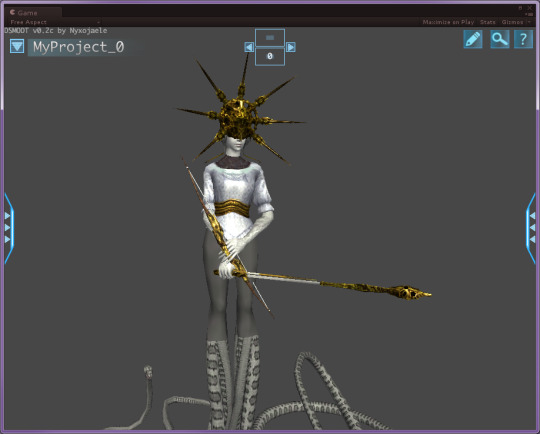
i would like to have snake legs one day.
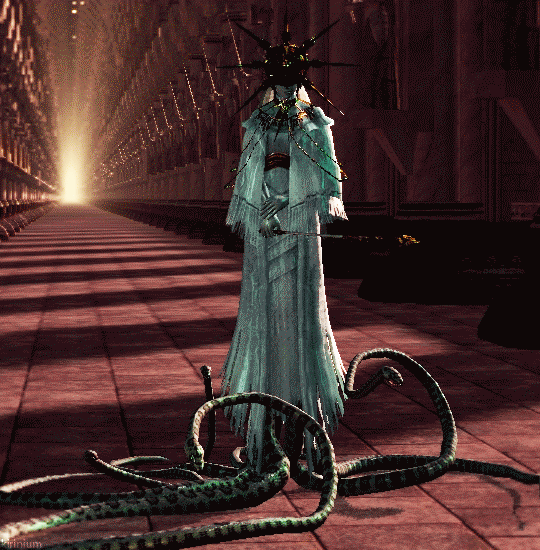
here's something else cute, today i was finding vintage fabrics on flickr:

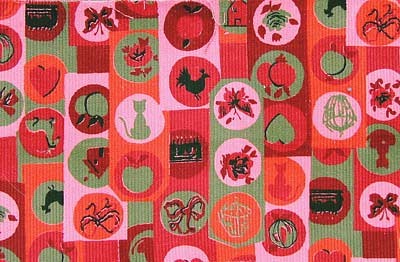


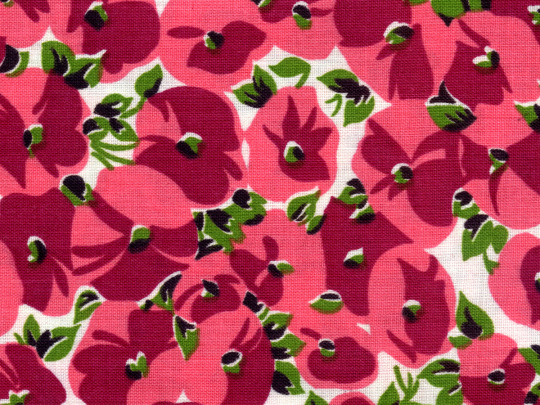
i'd like to find something to do w/ these, i imagine they'll be really good for cover art. here's another cute thing i found today, a flickr with some very pretty photos of things a woman owns/her home:




i hope the fourth cute thing i can talk about is this song being good. i need it to be good. i really want it to be right. maybe i am just ssstupidddddddd........ idk.
if that can't be the fourth cute thing, i hope i at least am, or something.
i am probably gonna wake up really late tomorrow.... guhhh
the next time i work is 6-9, at least, that'll give me time to unfuck my sleep. i can see the sun now. i hate it. i want to live under the moon forever, i've always preferred it, i think it's just so pretty.
i would like to record tomorrow but i don't think i'll be able to. i almost wrote that in past tense, like, i would have liked to have recorded tomorrow. which feels true but is a mess to read, but the affect it carries is how i feel. the future's turned to prediction now. but i can be wrong, i guess.
i think this song, really, honestly, is fine now. fourth cute thing accomplished, i am the fifth, hopefully, maybe, noww.
anyway i am so sleepy, i need to just go pass out now, so
byebye!!!!!!!!!!!!!!!!!!
1 note
·
View note
Note
How is your version of the Monster High movies different from the canon? Like, what’s your version of Why Do Ghouls Fall in Love, Escape From Skull Shores, Boo York, Scaris: City of Frights, Fright On, Ghouls Rule, Friday Night Frights, and 13 Wishes? I would LOVE to hear how you would rewrite them for your Reimagined series!! I also love how you have background characters like Invisi-Billy and Johnny become the main cast instead of just all girls. I also want to know what town Monster High is set in because they never said WHERE the movies take place.
Okay, this is gonna be a long one. Let's start with the name of the town near Monster High. Old Salem. Cuz the human town in Ghouls Rule is named New Salem. That's all I could come up with.
Now. The movies. Aka, The Timeline!
Let's begin. (Keep in mind that this could change in the future)
New kids at School.
A new School year at Monster High. We get to see the first month of school for new kids, Frankie, Gil and Abbey. We also get to see Invisi-Billy dealing with his new roommate Johnny Spirit.
Main Cast : Frankie Stein. Toralei Stripe. Draculaura. Clawdeen Wolf. Cleo De Nile. Deuce Gorgon. Lagoona Blue. Gil Webber. Abbey Bominable. Heath Burns. Clawd Wolf. Invisi-Billy Where. Johnny Spirit. Ghoulia Yelps.
Fright On!
Belfry Prep and Full Moon high merge with Monster High, bringing a bunch of new students with them. Most notable being Gory Fangtell and Dee O'Gee. Both leaders of their respective student body and they absolutely hate each other. Starting a race war between Vampires and Werewolves. With Clawdeen and Draculaura caught in the middle. And if that's not enough, the so called "human-monster relationship expert" is actually planning on hunting them all down.
Main Cast : Draculaura. Clawdeen Wolf. Clawd Wolf. Howleen Wolf. Romulus Timberwolf. Dee O'Gee. Gory Fangtell. Van Hellscream.
Why do Ghouls fall in love?
It's valentines day at Monster High. Also Draculaura's birthday! And Clawdeen is determined to make it the best day ever for her girlfriend. But Draculaura's ex-boyfriend Kieran Valentine shows up with the intend to win her back. Meanwhile Johnny deals with the fact he might be falling in love. And what secrets does the office of former student, C.A. Cupid hold?
Main Cast : Draculaura. Clawdeen Wolf. Kieran Valentine. Johnny Spirit. Invisi-Billy Where. Frankie Stein. Toralei Stripe. Cleo De Nile. Deuce Gorgon. Neightan Rot. Holt Hyde.
Skull Shores.
A group of students go on a special trip to Skull shores. The best monster friendly vacation resort in the world! The Wolf sisters try to sleep during the day to enjoy the night with Draculaura and Twyla. Johnny asks Neightan for love advice. Hoodude leads Manny, Iris, Wydowna and Billy on "exciting" Island trips. Lagoona helps Gil with his fear of the ocean. And Frankie, Toralei, Cleo and Deuce go on a mystery boat trip and make a huge discovery.
Main Cast : Frankie Stein. Toralei Stripe. Cleo De Nile. Deuce Gorgon. Andy Beast. Bartleby Farnum. Johnny Spirit. Neightan Rot. Lagoona Blue. Gil Webber. Hoodude Voodoo. Manny Taur. Iris Clops. Wydowna Spider. Invisi-Billy Where. Draculaura. Clawdeen Wolf. Howleen Wolf. Twyla Boogeyman.
Friday Night Frights.
Two rollerblading teams. Monster High vs Granite City. Only one winner. Let the race begin!
Main Cast : Operetta Phantom. Clawd Wolf. Clawdeen Wolf. Robecca Steam. Lagoona Blue.
Ghouls Rule.
Frankie gets upset over the incorrect presentation about Halloween. This is nothing like what she read about. She gets some surprising support from Johnny Spirit. He knows what Halloween is and this is wrong. But trying to show how humans really act during Halloween ends with Jackson and Holt getting arrested by humans! It's time for the Monsters to save them.
Main Cast : Frankie Stein. Johnny Spirit. Jackson Jekyll. Holt Hyde. Claire. Chad. Lilith Von Hellscream. Toralei Stripe. Invisi-Billy Where.
Scaris : City of Frights!
Clawdeen wins an opportunity to intern under her fashion icon. Moanatella Ghostier. But she's in competition with 2 other designers. Skelita Calaveras and Jinafire Long. Meanwhile, Rochelle goes searching for her missing boyfriend Garrot with the help of Spectra and Operetta and the local street artist Catrine DeMew.
Main Cast : Clawdeen Wolf. Draculaura. Rochelle Goyle. Operetta Phantom. Spectra Vondergeist. Garrot Durogue. Skelita Calaveras. Jinafire Long. Catrine DeMew. Moanatella Ghostier.
13 Wishes.
Howleen is going through a lot and the bullying from Gory Fangtell just sets her off. She ends up with a magical lamp containing a genie, Gigi Grant. Howleen, still in a fragile state of mind easily becomes manipulated by the shadow genie Whisp. Howleen's wishes end up making Gil a daredevil with no regard for his safety! And she erases Cleo from everyone's memory, almost everyone. Seems artificial minds are immune to genie magic. Clawdeen just wants to help her sister but things don't go well. Can Howleen be saved before it's too late?
Main Cast : Howleen Wolf. Twyla Boogeyman. Clawdeen Wolf. Gigi Grant. Whisp. Cleo De Nile. Robecca Steam. Hoodude Voodoo. Lagoona Blue. Gil Webber. Frankie Stein. Toralei Stripe. Ghoulia Yelps. Abbey Bominable.
Frights! Camera! Action!
Draculaura gets the chance to become the next vampire queen. Of course, she prefers to go on a quest to find the real one. And right when she's away is when Valentine and Whisp return trying to redeem themselves.
Main Cast : Draculaura. Clawdeen Wolf. Cleo De Nile. Deuce Gorgon. Robecca Steam. Clawdia Wolf. Honey Swamp. Viperine Gorgon. Kieran Valentine. Whisp. Elissabat Von Vamp. Lord Stoker.
Freaky Fusion.
It's Monster High's anniversary! And in an attempt to learn more about the past of the school, the ghouls end up going to the past! Where Robecca gets to meet her missing father. They try to return but once they get back to the present, they experience some interesting side effects. They fused! Can the hybrids help Cleolei, Lagoonafire, Clawvenus and Ghoulankie to cooperate?
Main Cast : Frankie Stein. Ghoulia Yelps. Cleo De Nile. Toralei Stripe. Lagoona Blue. Jinafire Long. Clawdeen Wolf. Venus McFlytrap. Neightan Rot. Avea Trotter. Bonita Femur. Sirena Von Boo. Viktor "Sparky" Frankenstein.
Haunted.
Frankie is being haunted. While Toralei is tormented by the return of Meowlody and Purrsephone. Spectra spreading rumors isn't exactly helping. While Twyla, Rochelle, Garrot and Sirena try to help Frankie with her haunting, Toralei joins them as they follow Spectra into the ghost world. And poor Johnny literally gets dragged into the adventure leaving a distressed Invisi-Billy no other choice but to get Headmistress Bloodgood involved.
Main Cast : Frankie Stein. Toralei Stripe. Spectra Vondergeist. Twyla Boogeyman. Rochelle Goyle. Garrot Durogue. Sirena Von Boo. Johnny Spirit. Invisi-Billy Where. Headmistress Bloodgood. Principal Revenant. Porter Geiss. Kiyomi Haunterly. River Styxx. Vandala Dubloons.
Boo York!
Catty Noir invites some friends to join her to Boo York where she's gonna perform at a royal wedding. The same wedding Cleo was invited too. Upon arriving they learn Cleo's disowned father somehow promised her away in an arranged marriage. While they come up with a way to break the marriage, Catty's voice gets stolen by the werecat twins, employed by Nefera De Nile. During the chaos Johnny decides now is apparently the right time to confess his feelings for Billy. Also, there's a meteor. And it's a musical. Yay!
Main Cast : Catty Noir. Cleo De Nile. Deuce Gorgon. Ramses De Nile. Nefera De Nile. Pharaoh. Johnny Spirit. Invisi-Billy Where. Neightan Rot. Frankie Stein. Toralei Stripe. Meowlody and Purrsephone. Luna Mothews. Elle Eedee. Mouscedes King. Astranova.
The Great Scarrier Reef
A fight between Lagoona and Toralei results in them falling into the pool, suddenly transported to the Great Scarrier Reef. And they're not allowed to leave until Lagoona faces her demons. For once Operetta and Johnny agree for Lagoona to hurry up so they can stop being half fish!
Main Cast : Lagoona Blue. Toralei Stripe. Gil Webber. Frankie Stein. Operetta Phantom. Johnny Spirit. Kala Mer'ri. Posea Reef. Peri and Pearl Serpentine.
Scarily Ever After
During the great school clean up. Draculaura finds a magical book in the attic. Suddenly, she, Clawdeen, Cleo, Deuce and Johnny get pulled into a fairytale maze where they run into the students of Ever After High, Raven Queen, Apple White, Maddie Hatter, Briar Beauty and Sparrow Hood, trying to stop The Evil Queen, Raven's mother, from enslaving Monster High. As if that's not enough, a magical stream swaps the Monsters with the Fairytale students. And who's this mysterious Euna?
Main Cast : Draculaura. Raven Queen. Clawdeen Wolf. Maddie Hatter. Cleo De Nile. Apple White. Deuce Gorgon. Briar Beauty. Johnny Spirit. Sparrow Hood. The Evil Queen. Euna.
And that's all I have so far. Of course there's stuff happening in between. Like the Bloom and Gloom and Freak Du Chic. But this is what I have so far.
94 notes
·
View notes
Text
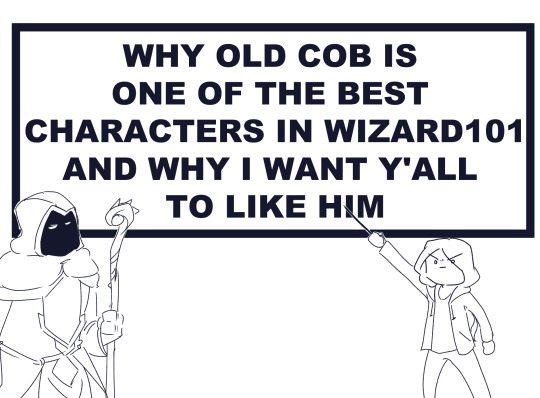
this is what happens when u enable me lets go
(spoilers ahoy)
Firstly, here’s some somewhat miscellaneous reasons that don’t contribute to any sort of narrative analysis but are still parts of the character I like.
His boss fight is my favorite in the game thus far. It’s not super hard, but it isn’t super easy either, and I even managed to solo it on my Balance after a few practice rounds. Sufficiently challenging without feeling unfair.
His boss fight music. It is a bop and a half, go give it a listen, my soul ascends from my body a few centimeters every time I hear it start up.
His voice. I’m sure it’s processed at least a little but gotdamn his voice is so deep and spooky it startled me when I first heard it. Very curious who his actor is; I think he and Inyanga Whitestripes share the same one. Either way, very well voiced and acted.
His design is very good. It’s the perfect mix of innocuous but also spooky sorcerer fella who knows some shit. And I was afraid that the designers would try and make him like. Handsome? Under the hood? To try and make him more sympathetic? But they didn’t and I’m glad for it.
With those out of the way, the next thing to establish, I guess: I don’t interpret Old Cob to be the main villain of arc 3, nor do I interpret Raven as such. They’re definitely antagonists, but they’re not the ultimate problem; the ultimate problem is their divorce, and how they keep dragging people into their bs. It’s established the Aethyr is a physical manifestation of their anger towards each other, and as it thins, communication between them becomes possible, as Sparck puts it in this thinly veiled metaphor toward the start of Empyrea part 2.


But Cob’s still an antagonist and I love him so I’m gonna talk about that. Most of this is going to be talking about his motivations for doing what he does, since I don’t see him quite as the ‘likes to watch the world burn for the hell of it’ archetype that others might.
One of the reasons that drew me to his character is how legit his gripe is, when put in perspective. Old Cob- or Grandfather Spider, if you prefer- is not a mortal like the other antagonists of previous arcs, which establishes he has a different thought process right off the bat. This new universe was built on his suffering and he has a grudge against the ex wife who made it, so as a god, it makes some sense he’d try to destroy it and build one he would like better. He’s fully aware that what he is doing will hurt people but decidedly doesn’t care, and I appreciate that so much. He’s chaotic as fuck and he owns it, along with his superiority complex that’s as wide as the day is long.
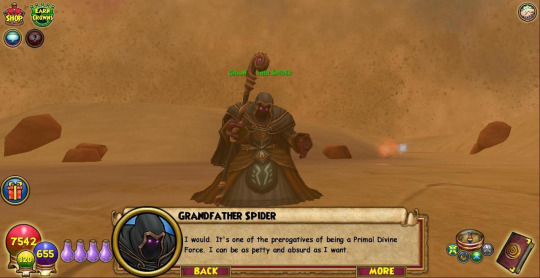
Yet his reasoning is like. Weirdly understandable? Like, if my ex-whatever put me in jail for a lifetime sentence and stole my kidney to pay for a new house or something, I too would go apeshit and want my fuckin kidney back. That’s mostly how I interpret his situation. He’s not doing this for hell of it, he’s doing it because he wants to get back at his ex because he’s bitter and petty and for the most part he knows this but he feels justified in doing do because she ripped out his goddamn kidney- I mean heart, and he wants that back.
And then, even after all that, he and his magic are treated as if they’re inherently evil. While, sure, Shadow is a ‘dark magic’, its actual properties aren’t anything malicious by itself. It is described as “a magic that changes reality,” and that’s it. Incredibly exploitable and you should practice caution while handling it, but used correctly it is powerful and helpful; this is likely alluding to the backlash mechanic, where likes decrease the percent of damage you take, dislikes increase the percent, and I imagine the person meant to be the literal embodiment of the magic in question to be similar in nature: not inherently harmful and lashes out if he feels he’s been mistreated.
Going off that, I’m not sure he ever wanted the FirstWorld to be destroyed, and therefore believes his incarceration to be entirely unjust; he doesn’t deny that he instigated the fight between the Titans, but when it comes to being accused of its actual destruction, he gets angry.

...Okay the written text doesn’t really display how mad he got here, but he was like. Big Angy. Super offended. Honestly, a big part of why I love and analyze the hell out of his character comes from how his VA delivers his lines and his voice in general. If you haven’t heard it for some reason, I recommend looking it up. Anyway, here he’s basically saying he didn’t destroy the First World, and even if he did, he’s suffered enough punishment because of it, to my interpretation. The only one I remember blaming him for it is Raven; Bartleby was there, and I don’t recall him blaming anything other than the Titans for it. This is of course not accounting for the various changes made to the lore since he was introduced, but they could have easily thrown in a line like ‘And now Spider plans to destroy the Spiral the way he destroyed the FirstWorld!’ or something to make it clear it was done intentionally.
And this may very well be straying into headcanon territory here, but I think he holds positive relationships very closely to him, even if things went sour in the end; he clearly still has some remaining affection for the Titans, calling them ‘the children’ and being incredibly angry at Raven for forcing one of them to destroy his Heart.
When Rat loses in Polaris he shows up to praises his efforts and even comfort him, in his own weird way. He reprimanded Scorpion in Mirage, but it’s because Scorpion wasn’t doing what his dad asked him to and got his ass kicked as a result. As for Bat, every time they’re in the same room together he pays him some sort of compliment.

Bat claims that he and his brothers are meant to be his tools, and to some extent that’s true, but he also genuinely cares about them, and it’s really interesting to see a villain defect from the usual ‘not caring about anyone other than themselves’ and openly show affection for his kids while still managing to be an incredible asshole.
In line with this is his relationship with the Wizard. There is, of course, a foundation of manipulation to their dynamic, at least to some degree. I thoroughly believe that Spider was overshadowing Coleridge, at least partly, so our character could bust him out of prison.


And while this is happening, he regains some of his spent power and removes threats to it as well, namely Morganthe, using the Wizard’s help. In fact, I have very little doubt that he was at least partially responsible for her fall; his timing on that two-liner was too on the nose.

But even with that, I think he genuinely treasures the Wizard’s help and company, which is why he attempts on four different occasions to either sway them to his side, or warn them away from what he’s doing.


Boy, I want that vacation, but it’s your fault I’m here.
And then, of course, his relationship with Raven, something that is basically a summation of his character arc. Laden with baggage and tragic in concept, it is my belief that most of what he’s doing isn’t because he genuinely hates the Spiral or he wants to get back at her, but because he loved her and treasured their relationship; so upon her mistreating him, he lashed out at everything she’d made and detested it as a result. But only because he felt betrayed and hurt so he has to inflict that on other people because he is, as aforementioned, a petty and bitter old fuck.
Moving off that line of thinking, an admirable quality he possesses is how smart he is. This guy has so many wrinkles in his brain it must look like a raisin. Well, perhaps not ‘smart’ exactly, but how good he is at manipulating certain situations to his advantage. Like in Mirage; you just know that he was fully expecting Mellori to be there and fully planned to use her as a back up plan, or you could even argue that the whole debacle in Mirage was a ploy to get his hands on her, while having the added possible benefit of things actually working out.
Actually his scheme in Mirage was really interesting now that I think about it. His aim was to turn back time to when the FirstWorld was whole, further implying that he never wanted its destruction in the first place. It would also, of course, be a time where he had his Heart and would have the ability to avoid having it ripped out again. This would involve not having the Titans fight each other again, or at least not starting it and suffering the consequences. It would be everything he wanted to achieve knocked out in one go with minimal muss or fuss, compared to other methods. It’s probably a part of why he shows up personally to bargain with Eerkala and the Cabal, and why he directly intervenes in our Wizard’s efforts to stop him; it was too important to trust to any of his kids, so knowing Scorpion probably wouldn’t have been able to execute it anyway, he used his kid as a distraction for the most part.
I also like looking into the fact that his element, besides Shadow, is Storm, as opposed to pure Shadow or Death, as most major antagonists are. Storm is a school based on invention, experimentation and improvement. This is something that interests me for two reasons: one, the magic of major antagonists is always a part of their character, Malistaire the most blatantly, and two, because of this line he says in Mirage.

To my interpretation, this would imply that he sees the Spiral as something that could be improved. And as a god, he would of course find it his obligation to try and fix this flaw. When he made the barter with the Cabal, I don’t doubt he was being at least partially honest about restoring the FirstWorld; it would certainly fix the flaw it has in the context of stealing his internal organs, but he would also probably seek to improve it, make it more suited to Shadow or something.
Something else I find intriguing is how weirdly honest he is; I don’t recall him ever lying to us once, unless you count omitting certain facts as lying. But that’s absolutely something I can see him using against people, like “I didn’t lie to you, I just didn’t tell you, your fault for not asking ¯\_(ツ)_/¯ .” As said before, he;s really good at manipulating people and he weaponizes whatever he can; @that-wizard-oki made a really great post about how he uses conflicts- his fault or not- to his advantage, and does his own thing in the background without interruption, Mirage and Neumia probably being the best example of this, with Scorpion and the Cabal serving as distractions while he either carries out things himself or gives instructions.
To pull all of this together narratively, I think it’s important to consider this line from Mellori during one of their confrontations:

He feels powerless, so he puffs up his god status. He has little power to fight with, compared to before, so he mostly manipulates and creates back-up plans while causing conflicts to serve as distractions. His love hurt him, so he lashes out at others and drags them into his problems.
You may ask, “But Sam, these are all bad qualities, why should we like him because of this?” And I would respond “Because it makes him a complex and interesting antagonist.” The kind of character that executes his shitty actions in such a way that you can’t help but respect- even just for the level of dramatics put in to it- while also having a motive that makes you stop and consider that maybe he has a point but is very much handling the situation the wrong way.
Like, c’mon, he ticks so many villain boxes. Tragic backstory? Check. Blatant thespian who owns it? Check. Gets his hands dirty before the climax of the story? Check. Smart/ manipulative/ has back-up plans? Check. Understandable, strong motives? Check.
He’s got layers. Like onion. I felt like there was always something new to discover about him, and for that I can assert my opinion that he’s one of the best characters in Wizard101.
lmao if you read this far into my simp-for-shithead post congrats. feel free to shoot me more asks on the subject bc i cant write persuasive-essay-esque format anymore my brain is rotting. if you will excuse me, im off to listen to the chronoverge combat track for the 82937487734th time
#i get that a lot of people havent gotten far enough into the game to meet him but I ENCOURAGE U TO TRY BC HE'S A GOOD AND FUN CHARACTER OKAY#i need more cob content >:U#wizard101#w101
101 notes
·
View notes
Photo

Crap jobs remain a cornerstone of our working lives (there's a whole book about it), and I'm under no illusions as to it having been better "back in the day," but the atomised nature of employment today — between market-lead shifts towards zero hour contracts and casual workers having zero rights, as well as the pandemic-necessitated shift to working from home — means the collective bargaining of previous generations is much more difficult to put into action. So I'm always interested to hear about alternative ways of resisting shitty work practices, such as the legends in this Novara Media article who've come up with all sorts of workarounds in their WFH set ups. This anonymous software developer is especially inspiring:
"Since working from home, I’ve basically been able to get my job done in half the time I would in the office. Being a programmer, I’ve figured out ways to automate the most annoying parts of my work. I’ve written a set of mouse and keyboard commands to fill out my timesheets, fill up my calendar with ‘private meetings’, and send out emails. Automated mouse movements also keep my Microsoft Teams status green, making it look like I’m hard at work. This is all against the rules, but it saves me hours. Right now, I’m taking Fridays off entirely."
This is obviously not quite the same as organised walkouts over poor pay or loss of pensions, but it's an effective form of resistance against a) jobs where attendance and looking busy appears to be the main thing, and b) work in general. Feeling a sense of resistance to work is, I think, entirely natural. For all the talk of a Protestant work ethic being inherit in humans, performing labour of which you are not a beneficiary in order to afford the rudiments of a comfortable existence is, and I hope this isn't a mad idea, a load of bollocks and totally unnatural. In How To Do Nothing, a book I won't stop wanging on about and I'm sorry for that, Jenny Odell writes about this "Bartleby The Scrivener"-inspired approach to striking. Not so much a justifiably-aggressive collective action, but an organised-or-otherwise shrug of "I would prefer not to." I was reminded of the concept when reading the article "Tired of Running in Place, Young Chinese ‘Lie Down'":
"The new lifestyle buzzword, tang ping [lie down], stems from a now-deleted post on forum site Tieba. Unlike similar, previous terms to have had their time in the spotlight in recent years, tang ping is an action rather than a feeling — resolving to just scrape by, exerting the bare minimum effort at an unfulfilling job, as opposed to the futility of raging against the capitalist machine.
"The author of the Tieba post described how he had been unemployed for the past two years yet did not see this as problematic. Instead of accepting and pursuing society’s ideas of success, he decided to just lie down.
“'Since there has never been an ideological trend exalting human subjectivity in our land, I shall create one for myself: Lying down is my wise movement. Only by lying down can humans become the measure of all things,' the user wrote in his lying-down manifesto."
The article goes on to explicate a fairly defeatist element to tang ping, perhaps understandably, but I don't think the acceptance of your material conditions and rejection of the standard way of improving them is necessarily throwing in the towel. It also certainly isn't the same as the rejection of society and replacing it instead with days dedicated to "lift[ing] weights and be[ing] self-sufficient through crypto," Hussein Kesvani's apt summation of nihilistic self-improvement bros. Quite the opposite: it chimes with something Guy Debord painted onto the walls of a Parisian street in 1953, and which I had on a poster in my room for a bit (because ofc I did): Never Work! Debord wrote, in response to a postcard reproducing his graffiti, disagreeing with its framing:
"Monsieur Buffier’s title, in fact, is 'Superfluous advice.' Given that it is well know that the great majority of people work, and that said work is, despite the strongest repulsion, imposed on the near totality of workers by a crushing constraint, the slogan NEVER WORK can in no way be considered 'superfluous advice.' This term of Monsieur Buffier’s implies that such a position is already unquestioningly followed by all, and thus casts the most ironic discredit on my inscription, and consequently my ideas and those of the Situationist movement."
Karen Elliot wrote more broadly, more recently, on the rejection of work, "which locates the wage-labour relation as the central pillar of capitalist relations and therefore the prime locus of attack." Her piece takes on the then-emergent trends of precarious work and the propaganda of productivity, which are now in full bloom, and places the struggle for an exit from this shitty situation within the history of Marxist thought:
"[Eduard] Bernstein, Engel’s literary executor and one of the most influential figures within reformist Marxism, argued in a series of articles under the title The Problems of Socialism (1897–98) that the ‘final goal’ of socialism would be achieved through capitalism, not through capitalism’s destruction. As rights were gradually won by workers, he argued, their cause for grievance would be diminished and consequently so would the foundation and necessity of revolution."
Which, well, see how that turned out. Not only have worker's rights been further eroded by the strategic destruction of labour unions, passing of laws which allow for predatory hiring and labour practises, but we're also at a point now where the opportunity to address "grievances" has been more-or-less removed by the business models of Uber, Deliveroo, Amazon, et al. But we also don't seem to be particularly close to a glorious fully automated luxury socialist revolution. So given all of that, why not just do the bare minimum and have a lie down?
3 notes
·
View notes
Text
Where the Ocean is the Sky Part One: Memory
A/N: AHHH happy pride month! I’ve been sitting on this plot for a while and I figured, what better time to start posting a wlw wizard101/pirate101 crossover than pride month? This part is just shy of 1800 words and I hope y’all like it!
xxx
“I can’t believe I let you talk me into this,” Andy mumbled to Captain Avery as they watched Madame Vadima peer over her cauldron. His expression was distorted by the candlelight of Vadima’s enclave, but she could still see that distinctive grin. Nothing ever made that man happier than knowing that he was winning.
He scoffed, not even sparing her a glance. “You’ve had nothing but gold in your eyes since I told you how much the client is paying.”
Andy’s eyes stayed trained on Vadima as the woman dropped what looked like batacuda eyes into the potion she was weaving. Ew. “Maybe we should take some time to rethink the Grizzleheim angle.”
“You can’t sneak into a small community like that. They’d have you made in a second. The client said that this would work.”
She tried to keep her face from scrunching up in disgust at the way he talked down to her. Years building up her reputation and Avery still talked to her like he did when she first came stumbling onto the island, wide-eyed and on the run from the Armada. They were gone now, thanks to her, and Avery still refused to speak to her like she was an adult. The only time he even acknowledged what she’d done- not only for him, but most of the damn spiral- was when he wanted something from her. Clearly he knew she was one the best. He just refused to actually say it. Subodai was convinced that he had a grudge because she had clearly surpassed his own skill level. Bonnie Anne thought that he was just an asshole and Andy couldn’t help but agree with the fox.
“Still,” Andy argued, watching Vadima sprinkle crushed cammun root over the mixture. “I’m not exactly in the habit of trusting people that won’t even tell me their real name. Or you.”
Avery let out a boisterous laugh at the last bit, clapping her on the shoulder. “Scared that I made this all up to poison you?”
“I wouldn’t put it past you.”
“It is ready,” Vadima announced, catching their attention. “And it is not poison.”
Andy took a step toward the cauldron. What had once been the clear blue water of skull island had turned into a thick, silvery liquid that shimmered as it reflected the lights around it. A large bubble rose slowly to its surface and popped. It looked more like liquid metal than something that was actually ingestible. Still, if there was something she’d learned over the last few years on the island, it was to never doubt Madame Vadima.
She sniffed the potion slightly. Cammun root. Figured. “So I drink this and it’ll make me look like a ghost?”
Vadima looked unimpressed with her question. “It will mask your life force and allow me to transport you through the spirit’s realm.”
“So a ghost, got it.” She glanced over at Avery, the wisps of a nervous expression on her face. “This is a lot of work for some old man’s staff.”
“It’s a lot of work for a lot of money, which we’re splitting 50/50.”
Andy rolled her eyes at his last minute attempt to renegotiate. “Nice try. 70/30, my favor. And don’t think I forgot to tell my crew that you agreed to still give them work while I’m gone.”
“The Steel Heart’s crew still has a contract, Captain,” he replied with a sigh. “Although I would have preferred you to hand the reins over to someone other than that wretched fox.”
“We need to act before it begins to boil.”
She smirked at him with pride. She might have done that on purpose. “You’ll get over it.”
Andy looked back over at the woman and the potion at her interruption. “Right.”
Quickly but carefully, she began to remove anything that would immediately identify her as a pirate. Her hat, coat, and vest all had to go, leaving her in a loose white shirt and her tight fitting pants. Her weapons belt was the last thing she removed, tentatively placing it in Avery’s open palm. Andy suddenly felt a lot more vulnerable than she’d been in a long time.
“I’m coming back for those, Avery.”
“Of course you are, Captain.”
If she was more naïve she might have thought that he was trying to reassure her, but she knew that he was only assuring himself. He was sending one of his best contractors into unknown territory unarmed and underprepared. This was a big job and they knew next to nothing about it. Andy didn’t even know how she was going to get back home once she stole the staff that Avery’s buyer was looking for. She had no idea how long it would take her to case the joint, form a plan, and wait for the right moment to execute it. The only thing that was certain was that she was going to be gone for a while. It crossed her mind, as Vadima handed her the silver coated ladle, that this might be a convoluted plan to get rid of her without outright killing her. She pushed the thought from her mind, spoon raised to her lips. Avery loved money more than anything else, and she was probably his most reliable supplier of it. He’d sent her on plenty of death defying missions before. She would be fine.
Despite it’s strange list of ingredients, Vadima’s mixture tasted oddly like vanilla. She never really understood magic, and she didn’t intend to learn. She was perfectly fine with shooting, slicing, and leaving all of the mystical nonsense to others. The vanilla bit at her tongue.
“You should feel it begin to take effect-”
Andy lurched toward Avery as a wave of lightheadedness washed over her. She watched his arms reach out to catch her but never felt his hands. The only thing she could sense was the cold. Like a freezing hand was wrapped tightly around her heart and was dragging her through a thick pool of water. She couldn’t tell seconds from hours. It felt like everything was happening in the blink of an eye and in the passing of days at the same time. Then her lungs started to scream. They were collapsing and being filled to their bursting point at the same time. She moved her arms wildly, searching for some kind of purchase, but there was no way to know up from down. Her hand found a piece of stone that was so cold that it burned, but it was firm. Strong. She pulled herself up.
Andy coughed and sputtered as she hit the cobblestone pavement, fighting to regulate her breathing. She could vaguely register the screams around her as she popped out of seemingly nowhere, but she couldn’t be bothered to take in any of her surroundings. The icy darkness of the spirit’s realm was clashing hard against the heat of this world’s sun and her body was going into shock. It had happened before- deadly injuries were common in her line of work- but she had had her crew with her then. People that she trusted. All she had here was a group of strangers staring at her with wide eyes.
“Give her some room!” Andy didn’t see who said it, too busy dying on the sidewalk. Someone gently took her head in their hands, resting her on their kneeling thighs. All Andy could make out of their face was the way that the sun streamed around them like a halo. Her vision began to blacken. And that’s when her savior started to hum.
It was soft and airy, a melodic tune that she didn’t recognize but felt oddly familiar. The song was calming in an unexplainable way, Andy could feel her heartbeat begin to slow and breaths even out as the woman continued her song, fingers resting lightly on her temples. Warmth radiated from the girl’s fingertips and it tasted like oranges on Andy's tongue. Magic. It had that same powerful tinge as Vadima’s potion, but where the potion was sour, this magic was sweet. Like indulging in Karamellian chocolate on a blissful summer night.
The feeling tapered out as the girl stopped humming and removed her hands. Andy took the opportunity to sit up, fingers running through the tangles in her hair once as she turned to look at the girl with the sickly sweet magic. She thickly swallowed as she finally got a good look at her savior. The girl's long dark tresses and light brown skin stood in direct contrast to Andy’s pale hands and fiery red hair. Her angel’s soft, symmetrical features were almost as ethereal as her eyes, big and brown, with just a hint of gold running around the edges. Andy felt like she couldn’t breathe again, but this time in a way that made her heart sing instead of seize.
“Are you alright?” Even the way she spoke made Andy feel dizzy.
“I . . .” she tried to speak but came out as only a breathy whisper. “Thank you.”
The brunette smiled at her sympathetically before placing her hands on her own thighs and pushing herself into a standing position. And just like that the spell was broken. Andy needed to get it together. This was a mission. She was here to steal something, not stare doe-eyed at the first beautiful woman she ran into.
“Alright, show’s over everyone. Get to where you’re going.” Footsteps started around them along with a few annoyed groans as the crowd began to disperse. The girl reached a hand down and Andy gingerly took it, letting the girl help her to her feet. Andy swayed purposefully as she stood, stumbling into the taller girl’s chest like she was still dizzy. It worked like a charm, the girl quickly wrapping her hands around Andy’s shoulders and looking at her with concern. “Let’s find you a place to sit down.”
“By Bartleby, Nora, what’s going on out here?” Andy’s head swiveled to the new voice, taking in the old, bearded man who was wearing the most ridiculous set of clothes the pirate had ever seen. His blue star-spotted robes looked like pajamas and his hat seemed to defy the laws of physics to balance on top of his wrinkling head. In his left hand he held a staff that clearly doubled as a walking stick, the golden head curling around a glowing blue orb. She recognized that staff. Avery had shown a drawing of it to her three days ago when she agreed to take this job. “Who is this?”
The girl- Nora looked at her expectantly, waiting for her to tell them her name. Andy’s mouth went dry. “I- I don’t know.”
#wizard101#pirate101#p101#w101#wiz101#wizzy101#fanfic#fanfiction#fic#wizard101 fanfiction#wizard101 fanfic#wizard101 fic#Nora Sunheart#miranda west#oc#pride
9 notes
·
View notes
Text
On Analysis Part 1 - Hermeneutics and Configurative reading (the “what” part)
“Without turning, the pharmacist answered that he liked books like The Metamorphosis, Bartleby, A Simple Heart, A Christmas Carol. And then he said that he was reading Capote's Breakfast at Tiffany's. Leaving aside the fact that A Simple Heart and A Christmas Carol were stories, not books, there was something revelatory about the taste of this bookish young pharmacist, who ... clearly and inarguably preferred minor works to major ones. He chose The Metamorphosis over The Trial, he chose Bartleby over Moby Dick, he chose A Simple Heart over Bouvard and Pecouchet, and A Christmas Carol over A Tale of Two Cities or The Pickwick Papers. What a sad paradox, thought Amalfitano. Now even bookish pharmacists are afraid to take on the great, imperfect, torrential works, books that blaze a path into the unknown. They choose the perfect exercises of the great masters. Or what amounts to the same thing: they want to watch the great masters spar, but they have no interest in real combat, when the great masters struggle against that something, that something that terrifies us all, that something that cows us and spurs us on, amid blood and mortal wounds and stench.”
― Roberto Bolano, 2666
Much of the background for this post in particular comes from Paul Fry’s Yale lecture course about the theory of literature. This is a great starting course for interpretation and textual analysis and, yes, film and TV shows are text.
In futzing around with this stuff, what am I doing? Less charitably, what do I think I’m even trying to do, here? Many feel that applying theory to art and entertainment is as pretentious as the kind of art or entertainment that encourages it. It’s understandable. Many examples of analysis are garbage and even people capable of good work get going in the wrong direction due to fixations or prejudices they aren’t even aware of and get swept away by the mudslide of enthusiasm into the pit of overreach. That’s part of the process. But this stuff has an actual philosophical grounding, so let’s start by looking at the stories history of trying to figure out “texts.”
Ideas about the purpose of art, what it means to be an author, and how it is best to create go back to the beginning of philosophy but (outside of some notable examples) there is precious little consideration of the reception of art and certainly not a feeling that it was a legitimate field of study until more recently. The Greeks figured the mind would just know how to grok it because what it was getting at was automatically universal and understanding was effortless to the tune mind. But the idea that textual analysis should be taken seriously began with the literal texts of the Torah (Rabbinical scholarship) and then the Bible, but mostly in closed circles.
Hermeneutics as we know it began as a discipline with the Protestant Reformation since the Bible was now available to be read. Sooooo, have you read it? It’s not the most obvious or coherent text. Reading it makes several things clear about it: 1. It is messy and self contradictory; 2. A literal reading is not possible for an honest mind and isn’t advisable in any event; 3. It is extremely powerful and mysterious in a way that makes you want to understand, your reach exceeding your grasp. This is like what I wrote about Inland Empire - it captures something in a messy, unresolvable package that probably can’t be contained in something clear and smooth. This interpretive science spread to law and philosophy for reasons similar to it’s roots in text based religion - there was an imperative to understand what was meant by words.
Hans-Georg Gadamer is the first to explicitly bring to bear a theory of how we approach works. He was a student of Martin Heidegger, who saw the engagement with “the thing itself” as a cyclic process that was constructive of meaning, where we strive to learn from encounters and use that to inform our next encounter. Gadamer applied this specifically to how we read a text (for him, this means philosophical text) and process it. Specifically he strove to, by virtue of repeated reading and rumination which is informed by prior readings (on large and small scales, even going back and forth in a sentence), “align the horizons” of the author and the reader. The goal of this process is to arrive at (external to the text) truth, which was for him the goal of the enterprise of writing and reading to begin with. This is necessary because the author and reader both carry different preconceptions to the enterprise (really all material and cultural influences on thinking) that must be resolved.
ED Hirsch had a lifelong feud with Gadamer over this, whipping out Emanuel Kant to deny that his method was ethically sound. He believed that to engage in this activity otherizes and instrumentalizes the author and robs them of them being a person saying something that has their meaning, whether it is true or false. We need to get what they are laying down so we can judge the ideas as to whether they are correct or not. It may be this is because he wasn’t that sympathetic a reader - he’s kind of a piece of work - and maybe his thheory was an excuse to act like John McLaughlin. He goes on to have a hell of a career fucking up the US school system
But it’s Wolfgang Iser that comes in with the one neat trick which removes (or at least makes irrelevant) the knowability problem, circumvents the otherizing problem, and makes everything applicable to any text (e.g. art, literature) by bringing in phenomenology, specifically Edmund Husserl’s “constitution” of the world by consciousness. It makes perfect sense to bring phenomenology into interpretive theory as phenomenology had a head start as a field and is concerned with something homologous - we only have access to our experience of <the world/the text> and need to grapple with how we derive <reality/meaning> from it. Husserl said we constitute reality from the world using our sensory/cognitive apparatus, influenced by many contingencies (experiential, cultural, sensorial, etc) but that’s what reality is and It doesn’t exist to us unbracketed. Iser said we configure meaning from the text using our sensory/cognitive apparatus, influenced by many contingencies (experiential, cultural, sensorial, etc) but that’s what meaning is and It doesn’t exist to us unbracketed. Reality and meaning are constructed on these contingencies, and intersubjective agreement is not assured.
To Iser, we create a virtual space (his phrase) where we operate processes on the text to generate a model what the text is saying, and this process has many inputs based on our dataset external to the text (not all of which is good data) as well as built in filters and mapping legends based on our deeper preconceptions (which may be misconceptions or “good enough” approximations). Most if this goes on without any effort whatsoever, like the identification of a dog on the street. But some of it is a learned process - watch an adult who has never read comics try to read one. These inputs, filters, and routers can animate an idea of the author in the construct, informing our understanding based on all sorts of data we happen to know and assumptions about how certain things work.
This is reader response theory, that meaning is generated in the mind by interaction with the text and not by the text, though Stanley Fish didn’t accent the “in the mind part” and name the phenomenon until years later. Note that Gadamer is largely prescriptive and Hirsch is entirely prescriptive while Iser is predominantly descriptive. He’s saying “this is how you were doing it all along,” but by being aware of the process, we can gain function.
For those keeping score:
1. Gadamer, after Heidegger’s cyclic process at constructing an understanding of the thing itself, centers on a point between the author and reader and prioritizes universal truth.
2. Hirsch, after Kant’s ethical stand on non instrumentalization, centers on hearing what the author is saying and prioritizes the judging the ideas.
3. Iser, after Husserl’s constituted reality, centers on configuring a multi-input sense of the text within a virtual (mental) space and prioritizes meaning.
Everything after basically comes out of Iser and is mostly restatement with focusing/excluding of elements. The 20th century mindset, from the logical positivists to Bohr’s view that looking for reality underlying the wave form was pointless, had a serious case of God (real meaning, ground reality) is dead. W.K. Wimsatt and M. C. Beardsley’s intentional fallacy, an attempt to caution interpreters to steer clear of considering what the god-author meant, begat death of the author which attempted to take the author entirely out of the equation - it was less likely you’d ever understand the if you focused on that! To me, this is corrective to trends at the time and not good praxis - it excludes natural patterns of reading in which the author is configured, rejects potentially pertinent data, and limits some things one can get out of the text.
Meanwhile formalism/new criticism (these will be discussed later in a how section) focused on just what was going on in the text with as few inputs as possible, psychoanalytics and historicism looked to interrogate the inputs/filters to the sense making process, postmodernism/deconstruction attacked those inputs/filters making process questioning whether meaning was not just contingent but a complete illusion, and critical studies became obsessed with specific strands of oppression and hegemony as foundational filters that screw up the inputs. But the general Iser model seems to be the grandfather of everything after.
Reader intersubjectivity is an area of concern. In the best world, the creation of art is in part an attempt to find the universal within the specific, something that resonates and speaks to people. A very formative series of David Milch lectures (to me at least) proffer that if you find a scene, idea, whatever, that is very compelling to you, your job is to figure out what in it is “fanciful” (an association specific to you) and how to find and bring out the universal elements. But people’s experiences are different and there be many ideas of what a piece of art means without there being a dominant one. So the building of models within each mind leaves a lot to consider as the final filtered input is never quite the same. There is a lot of hair on this dog (genres engender text expectations that an author can subvert by confusing the filter, conflicting input can serve a purpose, the form of a guided experience can be a kind of meaning, on and on ad nauseum)
The ultimate question, you might ask, is why we need to do this at all. I mean, I understood Snow White perfectly fine as a kid. There’s no “gap” that needs to be leaped. The meaning of the movie is evident enough on some level without vivisecting it. The Long answer to what we gain from looking under Snow’s skirt is the next episode. The short is:
1. You are doing it anyway. That Snow White thing, you were doing thhat to Snow White you just weren’t conscious of the process.
2. It’s fun. The process only puts a tool of enjoyment in your arsenal. You don’t have to use it all the time.
3. You’ll see stuff you like in new ways. The way Star Wars works is really interesting!
4. It may give dimensions to movies that are flawed or bad, and you might wind up liking them. Again, more to love.
5. It is sometimes necessary to get to a full (or any) appreciation of some complicated works as the most frustrating and resistant stuff to engage with is sometimes the most incredible.
6. It reinforces your involvement in something you like. It makes you more connected and more hungry, like any good exercise.
7. You can become more aware of what those preconceptions and biases are, which might give you insights in other areas of your life.
14 notes
·
View notes
Text
On minds and matters
It was a bit disheartening to spend years working towards an MA in psychology, only to then use it on hour-long glorified eye-staring contests with the moody adolescents of the UK’s Vieux riches. His job paid well, though, and as such Dr. Po was willing to grit his teeth and soldier on through each meeting on his list.
He’d had plenty of patients who came to him determined not to progress. These were the boys who had a few too many write-ups on their files; the ones whose families were tired of their son being too 'emotionally high-maintenance'; the students who had consigned themselves to being one of the ‘troubled’ boys. The problem with elite boarding schools was that they sometimes served as the dumping grounds for wealthy families who would prefer to not be reminded of their screw-up children — as such, Dr. Po’s target demographic was made up of boys determined to ‘win’ therapy by going home just as bitter and in pain as they were when they started sessions with him.
He didn’t always make a breakthrough. Sometimes, he had patients who showed up to a session with a note from Dean Guiney excusing them from further meetings, and that was that. Dr. Po firmly believed that every single student he’d met with was capable of finding some coping mechanism or outlet that would help them — and he hoped that the students whose sessions stopped before any progress had been made found happiness in the future. Or, at the very least, that they found something that would bring them peace.
There were certain patients he’d had that stood out from the others, both for good reasons and bad. Artemis Fowl II was one of those patients — and standing out for reasons ‘both good and bad’ described Artemis perfectly.
Following a series of disastrous sessions when the boy was thirteen, Dr. Po had simply stopped seeing Artemis. The boy hadn’t even shown up with a note terminating their sessions. One day, a new boy had shown up in the time slot usually reserved for Artemis, and that had been that. Dr. Po hadn’t seen Artemis since. He vaguely remembered hearing the news that the Fowl patriarch had been found — alive — and not been sure whether to expect Artemis to get better or worse.
Would the return of his father foster the growth of the nascent emotional maturity that Artemis had exhibited in their final sessions? Or would Artemis’ worst traits — his tendency towards arrogance, his dismissal of others, his budding narcissism — firmly take root, defining Artemis’ personality for good? These questions nagged at Dr. Po, and truthfully, he was too cowardly to ask around the staff to confirm just what sort of person Artemis had become.
Thus, Artemis remained an enigma.
An enigma that just so happened to be sitting in the armchair across from Dr. Po, boring a hole through the doctor with his unflinching gaze.
In true Artemis Fowl fashion, the boy had shown up for a session that had been reserved without a name. Dr. Po had nearly dropped his clipboard when he’d opened the door to usher in his new patient and been greeted with a now fifteen years of age Artemis Fowl standing before him, looking simultaneously defiant and sheepish.
They’d both walked into the room wordlessly, waiting in silence as Dr. Po awkwardly rummaged around in his desk for his old notes on Artemis while the young teen sat gingerly in the patient seat in the middle of the room.
“You’ve not switched to a digital filing system?”
Dr. Po started, looking up at Artemis.
“No psychiatrist or counselor uses iPads or digital notetakers,” Dr. Po explained hesitantly, brow furrowing.
Artemis wasn’t one for small talk, usually.
Shaking his head slightly as if to right himself, Dr. Po continued. “It’d be convenient, but there are concerns about the patient being recorded."
Artemis seemed satisfied with that answer.
Flipping his notes closed, Dr. Po studied Artemis, who raised a single brow.
“I’ve never forgotten our session that you left in the middle of,” Dr. Po remarked, and the frown lines on Artemis’ face deepened. “You were such a smarmy child. But you… made this joke.”
Artemis leaned back in his chair, tapping a foot in annoyance. “What a wonderful memory you have.”
“Not really. But it’s hard to forget a patient like you, Artemis,” Dr. Po sighed. “I tried to ask you about your feelings — you responded by telling me a family heirloom was a blatant forgery.”
The memory caused Artemis to smile genuinely for the first time since he’d stepped into the office. “The fake Victorian?”
The doctor grimaced. “Yes.”
“Despite its lack of authenticity, it was a perfectly nice armchair,” Artemis assured, a gently teasing note worming its way into his voice.
Edged on by Artemis' demeanor softening, Dr. Po pushed on. “But back to the joke. I remarked on the loss of your father — insensitively, I now realize — and you shut down. You started jerking me in this way and that in order to prevent me from getting a real reading on you. You said something along the lines of, ‘I’m depressed that I’m going to therapy,’ I believe. Quite a bon mot.”
“I was impudent as a young boy, I’m afraid,” Artemis said breezily, sounding more amused by the tale than remorseful. “I hope you’ll forgive me for a poor first impression.”
“Artemis, why are you back in my office?”
Artemis didn’t even blink, taking the challenge in stride. “My mother believes it will be beneficial.”
“Your mother? Not you?”
“Correct.”
“And… beneficial? To what end? Elaborate on her reasoning, perhaps,” Dr. Po asked, trying to keep his tone light.
“She believes I am emotionally maladjusted,” Artemis said, giving a small shrug.
“Are you?”
Artemis blinked owlishly, the question not quite computing. “Am I what, doctor?”
Dr. Po clicked his pen idly. “Unhappy.”
“Well, of course.”
Dr. Po was unable to keep his face neutral, and Artemis chuckled slightly at the doctor’s wide-eyed gaping.
“Dr. Po,” Artemis sighed, sobering as if he were explaining something evident to a child. “Of course I am unhappy occasionally. I’m a very busy man. My intellect has made it so I’ve moved beyond the carefree days of adolescence — I’ve matured past an age where my mother could treat me as a child, and although I don’t mourn the loss of simpler times, I suppose she does.”
Dr. Po forced himself not to ask if Artemis had ever truly been treated as a child, deciding to steer clear of the topic of family based on how unproductively the discussion had gone years ago. Instead, he elected to place his clipboard on the floor, looking at Artemis bluntly.
“Artemis, I’m not diagnosing you with anything,” he began, holding up a hand when Artemis opened his mouth to say something. “What I want to discuss today, however, is that right now I see the same pain in you today as I did when you were thirteen — and since I’m no longer getting complaints from department heads, that means you’ve taken that frustration and turned it somewhere else.”
Artemis’ lips quirked upwards, but his eyes were mirthless. “You share my mother's theory that I am some variation of the tortured genius stereotype.”
“How about this — I think that you believe that there isn’t a person alive smart enough to help you. Because to 'fix' you, someone would have to look inside you, and you think you’re the only person that’s able to understand how you work.”
“How narcissistic of me.”
“I’ve met with a lot of people since our last session when you were thirteen,” Dr. Po stressed. “I’ve not met anyone quite as clever as you, but I’ve met people who fit the same profile. You’re well versed in my profession, so you’re able to view your pain as both a participant and as an outsider — and that strangely voyeuristic relationship to your mind makes it so you and all these other folks think that you’re objective. Logical, even, in your analysis of your mind. You understand every tick, every tiny mechanism, every structure of your psyche. And if you understand it all and you still can’t will yourself to be happy, then why the hell should I be able to do anything for you? After all, I’m just some idiot who decorates his office with forged antique furniture his grandfather was gullible enough to purchase. Why should I know better than you do?”
Artemis was silent at that.
“If someone can, say, convince themselves that all their peers are 2D caricatures of people, they’ll never have to think about why they struggle to feel any pleasure from social interaction. If they can look around and see how far their family has come, then they can force themselves to box up and discard the baggage of the past. If they can convince themselves that pain and genius are twins, that the torment is part of the gift by which they define themselves, then the fear they have that maybe they’re destined for a life marked by paranoia and apathy no longer has to be confronted,” Dr. Po tried, searching for some way to express his thoughts before Artemis decided to snap at him. “Maybe you’re the only one who sees the world as it really is. But maybe your mother is right to be concerned. I get why… that’s an unattractive possibility to you. It would mean your analysis of yourself was incorrect. And if you were wrong, if your mind has tricked you into running away from the change that you need to feel happier, then you’re just as human as the rest of us. Pain tricked you into believing its integral to your ‘youness’. You’re... just human. And let me tell you, Artemis, that feeling ineffectual, and frustrated, and sad is... so very painfully human.”
By the time he’d finished his spiel, Dr. Po’s voice was soft. Pursing his lips, he tried to see if he’d garnered any sort of reaction from Artemis. The teen remained stony-faced.
“I can recommend a therapist from outside Saint Bartleby’s,” Dr. Po finally said. “If you don’t want to work with me, then I don’t want to waste either of our time.”
Artemis seemed to be broiling with unreadable intensity, and for a moment Dr. Po worried that he’d start going on a diatribe.
His fears soon were proven unfounded when all of the sudden, Artemis seemed to deflate.
“I do not choose sadness for myself, Dr. Po. I can assure you that,” Artemis remarked, sounding weary in the way men twice his age did when confronted by the prospect of the world having moved on past their prime.
“I would never imply something so insensitive,” Dr. Po insisted. “But there is a difference between me saying something of that sort and me asking you to believe that I could help you. Or if not me, then someone better suited to working with you.”
Artemis ruminated on the statement, his tapered fingers tapping out an unfamiliar rhythm on the arms of the ornate chair he was sitting in.
“I will come to my session next week,” he finally decided, and Dr. Po almost sagged with relief.
Carefully, the two of them continued on with the session. Although it felt as though they were both walking on eggshells around one another, the hour-long session ultimately ended in a place where Dr. Po felt like they could work with. He walked Artemis to the door, and after awkwardly bidding him goodbye, Dr. Po retreated back into his office.
For a while, he simply sat at his desk, thinking.
It wasn’t as though he’d made groundbreaking headway with Artemis today. Frankly, they’d been only nominally productive following Artemis’ promise to give therapy a genuine attempt.
The day stretched on, and Dr. Po was no closer to making sense of the ever-present Artemis conundrum.
After all, how does one describe Artemis Fowl?
Various psychiatrists have tried and failed. The problem is Artemis’ own intelligence. He bamboozles every test thrown at him. He has puzzled the greatest medical minds, and sent many of them gibbering back to their own hospitals.
Dr. Po paused, reaching back for the clipboard he’d discarded at the beginning of the session.
Artemis Fowl II was fifteen. He had various, tremendously important responsibilities, the details of which he refused to elaborate on. His best friend, to Dr. Po’s knowledge, was his paid bodyguard. Frankly, Dr. Po didn’t think they’d talk about Artemis’ family for a long, long time.
Dr. Po couldn’t really describe Artemis Fowl, because he didn’t know him. He didn’t think many people knew the boy, not really.
All the same, Dr. Po wanted to try. He wanted to try to understand Artemis Fowl a bit better. Not because Dr. Po wanted to a hero, but because he wanted Artemis Fowl to just get to be a boy instead of whatever impossible, confusing role Artemis seemed to be trying to fill.
Artemis Fowl was fifteen. Dr. Po hoped that he’d hold onto boyhood a little while longer.
43 notes
·
View notes
Note
HELLO.
I just wanted to say that I love, love, love your tags on that character/tool post a lot! Some of my favorite shows/books involve characters that can't keep it together and just barely make it to the end of the story or make it there in an "inconvenient way" and tbh I find that usually the narratives that follow these characters don't really work away from them either--the narrative is just usually more questioning instead of fully formed.
Like, 'what if/how would', y'know? There's less of a clear meaning and more just 'what if they hadn't done that. what if they had done that. what if all that meant nothing. what if that struggle was all there was'.
But oh boy, when they DO work away from the narrative. *chefs kiss*
I mean, most of my favorite Bleach characters are narrative nightmares who either hinder or cut off lines of theme in the story entirely. And, in general, I think there are A LOT of characters in shonen--a genre known for very long narratives that can't possibly complete every thought but also can't just abandon all those characters introduced ESPECIALLY the fan favorites or personal favorites--work in the way you described.
Tbh i think your tags really highlight why so many ppl get drawn to these characters/why they're so fun to play with in fanfiction.
If you have more to add or more thoughts about this you want to lay down I am here, eagerly awaiting and ready to pick them up.
Also, who do you think in Bleach is the most fun characters who sort of drop kicked the story, in your opinion? Who's the one you like the most? And who's the one you dislike the most?
[For posterity the referenced post is this one.]
Aww, thank you! That’s really lovely to hear. I was anxious about even putting it in tags because I don’t think I presently have the capacity to explain it well—and even if I did might still sound bananas to many. Or at least the bit about negotiating with characters and how *they* feel about being subjects in stories. Because as much as that really is my practice saying it out loud takes me back to like… FFN in 2003 where every store was prefaced by extensive chat-form back-and-forths between the fic author and their character "musies" and that is not something I think fandom would benefit from bringing back in force, hahaha. But anyway.
Here’s the part where I disappoint because I don’t think I actually know Bleach well enough to speak to it in this context. WHICH SOUNDS DUMB EVEN AS I TYPE IT BECAUSE LOL WTF IS THE NAME OF THIS BLOG WE ARE CHARLATANS AND POSERS FOR CLAIMING AS OUR NAMESAKE NOT ONE BLEACH BUT THREE BLEACHES but truly, my experience of Bleach has a shallow depth of field. I feel like I have weirdly intimate knowledge of some severe rabbit holes but a non-existent to uneasy sense of the gestalt.
Like idek man, in my "slow re-read where I am actually paying attention" Ichigo hasn’t even met Byakuya and Renji yet. ToT
I'm gonna put this behind a cut because it spidered all over the place, but in summary:
characters and their capacity to produce narrative failure
the charm of longform serialized series and their invitations to imagine stuff
me attempting to talk about Hitsugaya and feeling a fool, as usual
I guess in general terms, I’m really interested in characters and their capacity to produce narrative failure. Not failure as in 'bad' but failure as in things that break form or are circuitous or are actively detrimental to a narrative arc. All my strongest examples of what I’m thinking of are from a different fandom and therefore not relevant to this blog, alas. By comparison I think anyone in Bleach can keep it together better than the characters that are immediately coming to mind, lol. But I think this idea dovetails often with trauma narratives, or depression narratives, because these things are often… non-narrative? Like, there’s no fourth or fifth for minor fall or major lift. Sometimes it’s the same thing over and over again, or maybe nothing. Maybe it’s the exact same self-sabotage narrative dictates could have been avoided. Maybe it’s some act that emanates forth but cannot be explained because it cannot be explained and will never be explained. That’s a version of what I’m talking about, in any case, though not the only version.
Your note about longform shounen definitely resonates with me, too. In my mind I don’t like long things and I prefer series that are more self-contained but whenever I have ever landed in a long-term fandom, with a piece of media I felt obliged to carve out chunks of my life for, and to interact with at that level of creative fannishness, it’s always been something stupid long and serialized by the seat of its pants. I know plot holes or dropped threads bother a lot of people (makes total sense, don’t get me wrong) but I find these things incredibly attractive. I see them as invitations to join in the fun. Especially when it’s so much a part of the form and genre to have this, as you said, lack of real expectation that every thread will be followed to its conclusion (or that it would be worthwhile to do so) and every thought completed.
There’s this piece by David Grann that was published in The New Yorker in 2004 that I really love that speaks to part of this idea, albeit in terms of fictional universes versus fictional characters. But Grann is talking about Sherlock Holmes (Doyle original) and the ways that Sherlockians would like, approach apparent lapses in narrative and then solve them according to the established rules of the universe. I just love that. There’s also the line, "Never had so much been written by so many for so few," which LOL if that ain’t fandom I don’t know what is!!
I feel like I’m actually talking about three distinct but related facets of these thoughts in this post, except all at once and without clear transition, uhhhhh.
Gah, I am broken and now can ONLY think of examples from my not-Bleach fandom, but to try a different tack and add yet another facet to this already funhouse-mirror post, my various attempts to write Hitsugaya often feel like they come up against a version of this. I think Hitsugaya has aggressive side character energy, and I find it difficult to make him the center of a story and have it feel right to me. He feels different to me than writing other minor characters, where they can be the center of their own stories even if their story is not the main story. Like, two of my fave characters in my other fandom have literally like… three lines in 350+ episodes and it feels easier to imagine THEM at the center of their story and I think what it comes down to is that Hitsugaya probably prefers what he not be written. And when he does become more narrative I think he’d prefer that none of it was happening in the fist place. But at the same time he always seems to be…around??? whether there is really a good reason for him to be present or not. XD So while, say, he and Bartleby "would prefer not to" (because THAT'S what this post needs, a Melville reference), Bartleby actually opts out and Hitsugaya out here volunteering.
He also often feels non-narrative to me because he feels very declarative, if that makes sense? Like, the coming-to-decisions or coming-to-realizations parts of existence happen pretty quick, or are approached perfunctorily. I feel like I find narrative in the "coming" part of that equation and instead Hitsugaya will be like, well, I’ve already done that part without you, and/or plan to do that part in the future and it will still be without you, the audience. Anyway, here’s the determination I’ve made, here’s what I’m going to do, and here begins the long and probably tedious process of my doing that thing (off 2 go train in a cave for a bit). I don’t think he actually believes the world is that simple, Tab A into Slot B, but I do think he’s already made that assessment and can see coming to terms with that as a horizon, if that makes sense. So even if he doesn’t know the answer to something, or is completely at a loss of what to do (what to say to Hinamori? how to productively address the number Aizen’s done on him) there’s still not necessarily a story there. Maybe the answer is you grind, and it is repetitive and boring. Maybe you just hold things. There’s not even the act of learning how to hold things, necessarily, just the practice of doing so.
Wow, that probably doesn’t sound good! I feel like I need to suffix this with the assurance that Hitsugaya is my absolute runaway character in the whole series and this was true 15 years ago and it is still true now (truer, even) and everything I just said are reasons why I love him.
#i feel like this is one of those 'well.... that sure was a Post' situations#and i will have to try to articulate this better in the future#probably multiple times#ideally with concrete explicated examples for the sake of clarity lol#but please take this as an invitation to talk about YOUR read of Bleach/Bleach characters and/or elaborate on your also excellent tags
5 notes
·
View notes
Text
MAG 020 - Desecrated Host (part 2)
Summary: Jonathan reads the second half of the statement of Father Edwin Burroughs, regarding “his claimed demonic possession.”
I’d like to propose an alternate title for this one: “Bartleby”. I couldn’t help but see the parallel between Bartleby the Scrivener’s “I would prefer not to” and Father Burroughs saying, “seeing those bound corpses before me, I made the decision to take no action ever again.” Ah, Burroughs! Ah, humanity!
I mentioned in my last post that this episode was very heavy in the “altered reality” theme. I’d like to amend that: this entire episode was one long, terrifying fever dream. I’ve never been high but I think this might be what a bad trip feels like.
Jonny Sims et al. really outdid themselves on this one though, in both the writing and the performance. So many episodes really suck you in (not literally, fortunately - we’re luckier than some of the characters that way) and grip you ’til the very end. But this was one of the best so far for that. We get more than standard descriptions of things - we get things like that small, whispered “it was bright...so bright” in Father Burroughs’ description of the “church” and the resounding, gonging bell sound accompanying the bell-speech Father Burroughs hears. You can almost feel his throbbing head and blurring vision, and at times it just feels so real.
But it wasn’t. At least, not in the way that we like to think of reality. Whatever an outside observer might have seen that night, this statement was Father Burroughs’ reality. We do know that at least some of this episode was real in the normal sense of the word though. There are snippets, like Father Singh’s reaction to seeing Father Burroughs in the small chapel, and Father Burroughs later seeing Father Singh in the hallway, that seem like they were part of objective reality. Was this slip between reality and the illusion just so that we, the audience, knew that it wasn’t real? Or was it because whatever was affecting him couldn’t keep an airtight grip on his senses? I’d like for it to be the latter, but I’m worried that’s not the case. I do not like how powerful this thing seems to be.
During the “confession”, “Father Singh” recounted all of Father Burroughs’ past sins...so this thing either actually knew about all of those events, or it made Father Burroughs imagine that “Father Singh” was naming all of his sins (a la the psychic paper in Doctor Who). Also disturbing was the detail about its accent during the “confession” - it had “a crisp and clipped RP accent”, as opposed to Father Singh’s Indian one. The change in accent made it obvious for us that it was not Father Singh speaking, but otherwise it just makes no sense to me. Was it unable to imitate Father Singh’s accent for some reason? That might fit if it’s the same thing that spoke in a “low, grating voice” to Laura Popham in episode 15. But those are the only two times (that I recall) that the person making the statement has noted a change in the person’s voice when that static appears.
There are two possibilities I’m seeing for how this thing operates. Either it’s little more than an illusionist, or it can actually alter reality itself. The first would certainly be easier to deal with, but I’m leaning towards the latter. My main reason for thinking that is not strictly things seen in this episode, but more how things in this episode seem to relate to things in the rest of the season so far. We hear that recurring creepy static/interference twice in this episode, once when Father Burroughs reads Genesis 4:14 (after opening his Bible to Luke, no less) and once when “Father Singh” says, “Spiritual pride that has led to quite a fall.” And of course we have another appearance of creepy eyes: “the church’s large round window shifted as I watched, as though it were a tremendous eye that were turning to focus upon me.” The eye and the staticky voice tie these events to many others from the first half of this season, including a few times when reality itself seems to have been affected, rather than just people’s perception of it.
There were two Bible passages referenced in this episode. The second was Mark 9:14-19, which appears to be a pretty straightforward reference to Father Burroughs’ situation, as that passage tells the story of a boy “who is possessed by a spirit that has robbed him of speech” (NIV). But the first, as mentioned in the paragraph above, was Genesis 4:14: “Behold, thou hast driven me out this day from the face of the Earth, and from they face shall I be hid. And I shall be a fugitive and a vagabond in the Earth, and it shall come to pass that everyone that findeth me shall slay me.” And the writing around it seemed to swirl and was “obscured by dark stains”. This is obviously significant, given the static and the unexplained stains and the fact that this verse is actually quoted in the text (unlike the passage from Mark also in this episode, which was referenced but not quoted). But I can’t figure out the significance of this verse. Cain says the text of this verse to God after God banishes him for killing Abel. Cain is more or less saying that his punishment is too much to bear and that he fears for his life, presumably from others who will surely be angry about him killing Abel. The only possible parallel I can see between Cain and Father Burroughs is that they’re both cut off from God. If there’s anything more to this verse, I’m not getting it.
I’ve also been wondering about the various figures Father Burroughs sees throughout this hallucination. He sees shadowy figures along the street that “were always gone when I approached” - and then there were the parishioners in the pews at the “service”. Were the shadow figures the parishioners? Or were the shadow figures actual, real people, and his inability to reach them just a reflection of how trapped in this hallucination he was? And why did the parishioners come and go like that? Why were they leaving before the “service” was over? If they were real people then I think they had to have been members of the People’s Church of the Divine Host (episode 9). I just feel like there was something else going on at the “service” that Father Burroughs wasn’t privy to.
At the end of the episode, Jonathan calls attention to the man who met Father Burroughs at the Oratory door: “the altar server he described seems out of place with most of his other delusions, in that he appeared to have active agency.” We aren’t given much of a description of the “altar server” - he is tall, pale, and has thin, bony arms. None of that rings any particular bells (haha) to me, but I guess I’ll be on the lookout for a tall, pale guy with thin, bony arms. *shrugs*
“Cause of death was listed as blood loss from multiple lacerations all over their legs and torso, as well as removal of both their faces with a sharp blade, possibly a scalpel.” However, no tools or weapons were found at the scene, and “at no point did he perform any actions that might be analogous with the binding and actual murder of the students,” leading Jonathan to believe a second person was there. HMMM. I WONDER WHO THAT COULD HAVE BEEN.
The cause of death is very unusual, though, when you consider it from a real-world standpoint. It’s pretty easy to die of blood loss if, say, your carotid or jugular is cut. But lacerations on the legs and torso? Those lacerations would have to be extensive to cause fatal blood loss. It just doesn’t sit right with me - and it reminds me of another death we heard about previously. In episode 8, Ivo Lensik says his father was found dead in his study “with deep gouges along his wrists and arms”, and the coroner couldn’t identify the tool used on his arms. Robert Montauk (episode 9) also bled out, but that was after being stabbed 47 times, so it’s similar but not quite the same. The common threads I’m seeing in all three deaths are (a) cause of death being blood loss and (b) the idea that someone committed the murder who was not known to be there at the time.
Coincidentally, Father Burroughs was imprisoned at Wakefield Prison, the same place where Robert Montauk died a few years prior. I thought something might be up with that prison, so I did a quick search and apparently it’s a high-security prison for those who’ve committed crimes such as murder, rape, armed robbery, and kidnapping (Wikipedia). So there may not be any kind of supernatural connection there, but now I’m wondering if we’re going to get statements from or about anyone else in that prison.
One last observation. The sickly yellow color seen so many times in episode 18 made two appearances in this episode. Father Burroughs describes the parishioners at the “service” as having “fevered, jaundiced yellow” skin, and the stole that Mystery Altar Server gave Father Burroughs was “a pale, sickly yellow.” Oh, and that stole from Father Burroughs’ fever dream? An identical real one was delivered to the Oratory a few days prior to these events by Breekon and Hope Deliveries. And it must have been one of their last deliveries, since they liquidated some time in 2009, the year these events occurred.
Curiouser and curiouser...
This post is part of a series where I write my thoughts about each episode and obsessively connect dots in an effort to figure out The Big Mysteries of the series. All posts in this series are tagged “is this liveblogging?” Comments and messages are welcome but I have only listened to season 1, so I ask that you not spoil me for anything beyond episode 40. In the words of Jonny Sims…thanks for listening!
#personal#liveblogging#is this liveblogging?#The Magnus Archives#Bartleby the Scrivener#I'm tagging that in the hopes that some poor soul looking for help or commiseration on their high school English reading assignment#sees this post and is like 'what. pray tell. the fuck'
6 notes
·
View notes
Note
4 and 5 for the Tolkien ask game?
- @kingkendrick7

Hi @kingkendrick7! Thanks for the asks. I'm really looking forward to answering these! If you aren't following Kendrick yet, go check out his Writeblr Intro and About Me post! He's got demons and vampires and a writing club, oh my! P.S. If you want to participate in this ask game, take a look at the full list of questions here: Tolkien Ask Game
I had a hard time distinguishing between these two questions, so I answered No. 4 for the research/expertise that went into creating characters for The Sorcerer's Apprentice and No. 5 for the research/expertise that went into worldbuilding. I hope this division keeps with the spirit of the original asks! Also, I apologize in advance for the enormous info dump you are about to receive lol You have summoned my inner nerd. Sorry, not sorry ;)

4. What are your elves and dwarves? As in: something you studied or know a lot about, something you can geek out about, etc.
✦ Cucufate: (pronounced: Coo-coo-fah-teh)This is a secondary character I haven't spoken about much because I keep going back and forth on some of the minor details. Generally speaking, he's a monkey (a Colombian Night Monkey or Aotus Lemurinus) who lives in Valeriano's mansion and befriends Altaluna. His character is based on two figures: the ancient philosopher Socrates and Bartleby from the short story Bartleby, The Scrivener by Herman Melville. What I wanted to do with Cucufate is find a way to have an animal speak without necessarily resorting to a 'human' voice (a voice that furthers our aims, mimics and thus elevates our culture, clarifies and informs etc.). This is where Socrates and Bartleby enter the picture. They both provide a language model that subverts standard communication. For instance, despite being the primary character in Plato's Dialogues and one of the most famous philosophers of all time, Socrates makes no positive or prescriptive claims (thou shalt not blah, this is that etc.). Instead, he talks in (flattery &) questions, undermining any certainty his interlocutors might feel by prodding and probing their knowledge of x, y & z until they are forced to reveal their ignorance (this is known as Socratic irony). Socrates' speech is thus a kind of anti-speech. If it spotlights a topic, it does so only to reveal the immensity of the darkness that sustains it, its lack of substance. Indeed, whenever Socrates opens his mouth, he widens the abyss that will eventually swallow his interlocutor's thoughts and beliefs whole, and terminate the discussion (silence). Hence, Socratic dialogue successfully humiliates and confuses us. It strips us of that very human arrogance, our intellectual bravado, so that we too can become wise: so that we too can share in the wisdom of knowing that we don't know. Doesn't the natural world do the same? Isn't that precisely the horror of climate change? The root of the unease we feel before our uncanny valley primate cousins? Bartleby, on the other hand, taps into the ambiguity of certain language formulas. His signature phrase "I would prefer not to," which he repeats whenever he's asked to do his job, expresses a hypothetical that... never seems to go anywhere? It's the Schrodinger's Cat of phrases, simultaneously dead and alive; he'd prefer not to, but... will he or won't he? Yes. The ambiguity, the inaction of it, dumfounds and incapacitates his employer. Bartleby's speech thus provides an example of a language that resists, confounds rather than clarifies, and complicates rather than simplifies. Like Socratic irony, Bartleby's masterful use of the conditional and modal auxiliary verb "would," disrupts the status quo. Because Cucufate's speech pattern draws from both of them, he becomes an effective helper to Altaluna; by engaging with her, he counteracts the temptation to think along the lines of a simplistic, "heroic" fascism (good vs. evil, light vs. darkness, us vs. them), and forces her instead to adopt a more nuanced stance, capable of aptly handing contradiction and ambiguity.
✦ The Secret to Altaluna's Success: I can't really explain this one without explaining the magic system. Since I don't want to give anything away before the big reveal, all I'll say for now is that Altaluna's strength as an individual and as a magic-weilder (although that's the wrong word, really) can be understood in reference to "La Conciencia de la Mestiza" (Chapter 7 within Borderlands) by Gloria Anzaldúa.
✦ Valeriano's Cruelty: Partially inspired by The Imp of the Perverse by Edgar Allan Poe (and he would know, wouldn't he, what with his cousin being 13 and a literal child when he married her). If you haven't read it yet, I couldn't recommend it more highly. It's very disturbing. To summarize, it tells the tale of a man gripped by the so-called "imp of the perverse," a self-destructive tendency to do exactly what he shouldn't precisely because he knows he shouldn't do it. A large number of Poe's characters take this tendency to the extreme. Valeriano does so to a lesser degree. Like Poe's characters, he enjoys doing the wrong thing because it's wrong but, unlike them, he won't put his life or his career at risk to satisfy this urge. So, who ends up suffering from Valeriano's perversity? Easy. Only those people who have the misfortune of being beneath him on the socio-economic ladder i.e. only those incapable of defending themselves against him. In this way, I've also written Valeriano as a critique of Western philosophy's stance towards 'evil.' From Plato to Kant to Arendt, philosophers have been adamant that people do not commit heinous acts because they derive pleasure from them, but rather because they lack 'the good' (respectively: knowledge of the 'idea of good' for Plato, a correct understanding of the moral law -the categorical imperative- for Kant, and, finally, the activity of thought for Arendt). 'Evil,' in most of Western philosophy, is always an absence of 'the good'. It is not a thing-in-itself. It has no positive, independent existence (the same goes for ugliness, but that's another discussion). Like Poe with The Imp of The Perverse (and Dostoyevsky in Crime and Punishment), I'm using Valeriano to disagree (and to show JUST HOW MUCH I disagree lol).
✦ Valeriano's Attitude Towards Truth: Partially inspired by contemporary French philosopher Michel Foucault's account of parrhesia in his lecture series, The Courage of Truth. Basically, parrhesia is a type of ancient Greek truth-telling that implies courage because by participating in this speech act both the truth-speaker and the truth-listener risk their lives; the speaker by possibly incurring the all-powerful wrath of the listener, the listener by risking the possibility of being made profoundly vulnerable by the speaker. Valeriano's exchanges with Altaluna's father, Peregrino, are an example of a failed attempt at this form of communication since Valeriano rejects any attempt at truth-telling from him. Indeed, he exiles and punishes Peregrino and, by extension, Peregrino's family for daring to confront him with his own monstrosity, which he refuses to acknowledge. By the time The Sorcerer's Apprentice commences, Altaluna has been thoroughly warned of Valeriano's inability to be a truth listener, and so, although she offers him opportunities for parrhesia, neither he nor she fully engages in this act as Altaluna is unwilling to risk her family's well-being a second time. This has two further consequences for the narrative. First, it means that while Peregrino is 'free' because he was able to define himself within the speech-act, namely to autonomously determine himself as a subject of a certain kind in relation to the truth, his truth, and to act accordingly; Altaluna's sense of self and her field-of-possible-actions are entirely dominated by Valeriano. She is who he says she is, what he allows her to be. She exists only between the limits of what he's willing to tolerate. This gives us an idea of where the plot has to go in order for Altaluna to reach the peak of her arc, aka. a moment where she wrestles free from underneath Valeriano's power and participates in a fully successful act of parrhesia. However, since we've established that Valeriano is incapable of being a truth listener, then it's clear that in order for this moment of liberation to finally come Valeriano and Altaluna's relationship needs to be turned on its head; Valeriano needs to become the truth speaker and Altaluna the truth listener. Furthermore, that the parrhesia has to be successful implies that Altaluna is going to have to hear something very hurtful from Valeriano and not abuse the power she has over him to punish him for it (as he abused the power he had over her father, Peregrino). Finally, and this is the second point I wanted to make, this reversal between Valeriano and Altaluna provides a commentary and critique on the efficacy of parrhesia in undermining (certain degrees of) domination.
5. What are your Middle Earth languages? As in: something you have expertise in due to a career, a hobby, something you love, etc.
✦ The Magic System: I'm actually not going to say too much about the magic system because I don't want to give anything away before the big reveal. For now, just know that the mechanics are equally inspired by contemporary French philosopher Maurice Merleau-Ponty's 'Ontology of the Flesh' as contained in his article Eye And Mind and his unfinished manuscript (published posthumously), The Visible and the Invisible, which I wrote my BA dissertation on; and Philosophy as a Way of Life by Pierre Hadot, where he argues that the true product of philosophy is the philosopher themself. It is also heavily influenced by Cunning Intelligence in Greek Culture and Society by Marcel Detienne and Jean-Pierre Vernant, which just so happens to be one of my favourite academic texts of all time (and a fantastic read if you like Greek mythology).
#writeblr#writeblr community#writers of tumblr#wtw community#wtw#writeblr ask games#ask game#writing ask games#writeblr tag & ask games#tolkien#there are a few extra things but I totally burnt out writing this lol#anyway i think that gives a good general overview of my favourite bits of research and how I've used them in the novel!#philosophy
4 notes
·
View notes
Text
Day Six: Arc One World Critique
This will be a review/critique of each of the five worlds in the first arc--what I thought was effective and ineffective about each world’s plotline, setting/lore, and characters! Spoilers: there are a lot of Problems but I still love this horrible little game anyway.
═══*.·:·.✧ ✦ ✧.·:·.*═══

.·:·.✧ Wizard City ~ A- ✧.·:·.
✦ Plotline ✦
Wizard City functions well as an introduction to the game. We immediately get introduced to the main villain, but we don’t know what his plan is yet. The Wizard’s mission, at this point, is to stop Malistaire’s undead from overtaking the streets. After we defeat Lord Nightshade, we learn that this was all a distraction from Malistaire’s real plan--to get the Krokonomicon from Krokotopia. Even though this means that what the protagonist did in Wizard City doesn’t have a direct connection to the main plot, I still think that it works well as a low-level story.
I appreciated the originality of some of the subplots on each street; some standouts include stopping undead from siphoning powerful Storm magic from the Storm Mill on Triton Avenue, as well as defeating Cyclops Lane’s Cyclopes and Trolls, who were originally summoned to defend against the undead.
While some of the side quests were just your standard MMORPG delivery or defeat quests, some were also pretty interesting! For example, Gloria Krendell’s and Duncan Grimwater’s quests provide insight into Malistaire’s backstory. Even the more simple-seeming quests had flavor text that made it a bit more fun. Being sent to defeat a boss to get back the Sleeper’s Timepiece, a watch that can bring nightmares to life, is a lot more interesting than being sent to defeat a boss who’s just evil and attacking citizens.
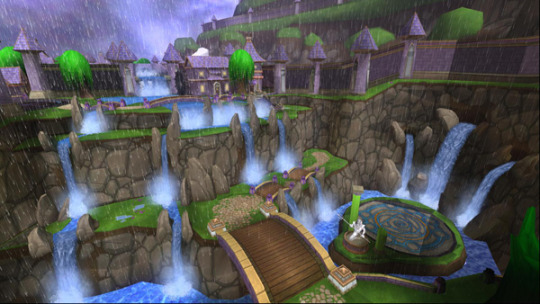
✦ Setting and Lore ✦
Every game needs to start with a relatively basic area, and in this one, it’s Wizard City. Still, I love all of the little details that flesh out the world. The devs could have chosen to go with really basic fantasy areas and use just houses, castles, and libraries. Instead, we have places like the Storm Mill--“one of the main sources of magical energy for all of Wizard City,” the Hedge Maze that is watched over by an ancient seraph, and the Fireglobe Theatre in the center of a burning street. It’s also really cool how all of the different streets have a different “feel”--Triton Avenue seems very industrial, Colossus Boulevard seems very upper-class (despite the Gobblers), and Firecat Alley seems very artsy and creative. Having abandoned areas like the Haunted Cave and mysterious places like Sunken City imply a history to the world. Still, Wizard City doesn’t feel like it has much of a past.
Overall, Wizard City has a good amount of lore with the various magical creatures and villains, especially considering Bartleby, the creator of the Spiral, lives here. With the addition of the Catacombs quest, it seems like Wizard City has a lot going on behind the scenes.
✦ Characters ✦
Very few characters stand out at this point in the story. I liked Duncan Grimwater’s arc (although this doesn’t pay off until arc three), and I loved dealing with the shenanigans of both Nolan Stormgate and Cyrus Drake while questing in Cyclops Lane. Still, none of the characters have any major presence besides Ambrose, who is just there to be an Old, Wise Wizard. I would have liked there to be a maximum of six or seven major characters, possibly to represent each of the main schools. They wouldn’t all have to travel with us everywhere, but it would be cool to have more overlap instead of just meeting one or a few separately in each street. I also wish that some of the villains had a larger presence in the story. We don’t even hear about Lord Nightshade, the final boss, until we’re sent to fight him.

.·:·.✧ Krokotopia ~ B- ✧.·:·.
✦ Plotline ✦
In Krokotopia, the Wizard is chasing Malistaire to try and prevent him from getting the Krokonomicon, a book of powerful Life and Death magic. They are also stopping the awakened Kroks and some undead along the way. The plotline could have been more compelling if there was more of a focus beating Malistaire to the Krokonomicon, stopping Malistaire, or having Malistaire find different ways to stop the Wizard. Instead, Malistaire has very little presence, and we learn at the end that he beat us there--who knows how he got there or what he was even doing the whole time.
By itself, though, Krokotopia’s plot isn’t too bad. Freeing slaves and reassembling an ancient magical order of anti-authoritarian Kroks is a good premise.
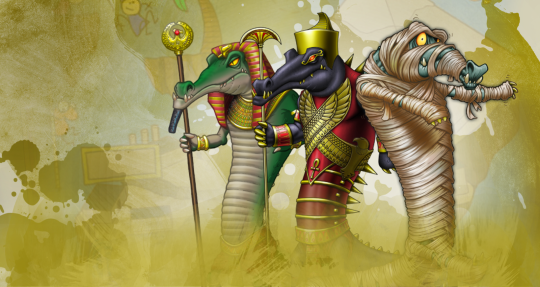
✦ Setting and Lore ✦
Krokotopia’s setting is somewhat compelling in theory, but I do wish there was more variety--we’re pretty much inside hallways the whole time. I liked how each major area (the Pyramid of the Sun, the Krokosphinx, and the Tomb of Storms) has their own Krok leading family, such as the Nirinis and Sokkwis. I liked the family conflict between the Ahnics and Djeserits in the Tomb of Storms, as well. Krokotopia has a much more obvious history to it than Wizard City. I really liked the Marleybone presence, as well, which hinted at their dominance over many different worlds in the Spiral; it also showed that the various worlds are interconnected and not just levels in a game.
✦ Characters ✦
Yeah, no one in this world is particularly important. The major Marleybonean characters are pretty much just there to give quests, and the villains are just there to be something to fight, similar to Wizard City. Hetch al’Dim’s character trait was Anxiety, which I thought was pretty cute. Alhazred’s character trait was Old, so… alright. Once again, we get introduced to our final boss pretty much right as we have to fight her. Still, her design is pretty fabulous, so that’s cool.
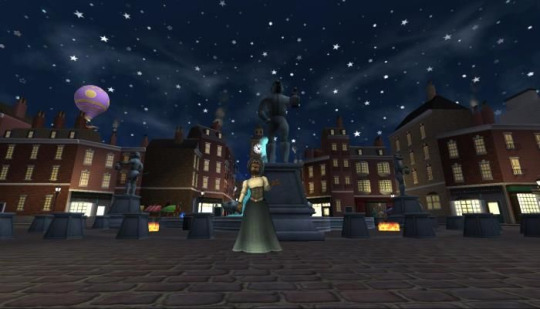
.·:·.✧ Marleybone ~ D+ ✧.·:·.
✦ Plotline ✦
Marleybone’s importance to the overall plot of arc one is minimal:
1. Malistaire frees Meowiarty so he can steal the Krokonomicon.
2. Malistaire gets the Krokonomicon.
These last two events happen at the very end of the world, so everything else feels like a lot of filler. The Wizard has to put a stop to gang uprisings and attacks by automatons, only some of which Malistaire is connected to--and these were only started to interrupt the Wizard chasing him. It would have been great if the narrative as a whole was a mystery; despite having some elements of a mystery story, it wasn’t one. Also, it would have been interesting to have more of a focus on the obvious social issues occurring in the world. We see the dogs discriminating against the cats, rats, and frogs throughout the story--accusing them of crimes they didn’t commit and literally paying the Wizard to attack Street Sweepers out of a pavilion who were doing nothing but loitering, at worst, just because Abigail Doolittle wanted to have a party celebrating the police. Yikes!
Beyond that, a lot of the side quests were unquestionably bad. I always hate doing the quests for the ladies in Marleybone, because it’s all just bringing hats and scarves to different places. One quest like that would have been fine.
The moment when the Wizard had to chase Malistaire and Meowiarty during the prison break was pretty fun, although (as @calamity-callie pointed out) they immediately moved to an unrelated case in Knight’s Court instead of just continuing to ramp up for the Meowiarty fight. This makes the story seem kind of janky. Again, I would have preferred for both Malistaire and Meowiarty to have more of a presence in the story.
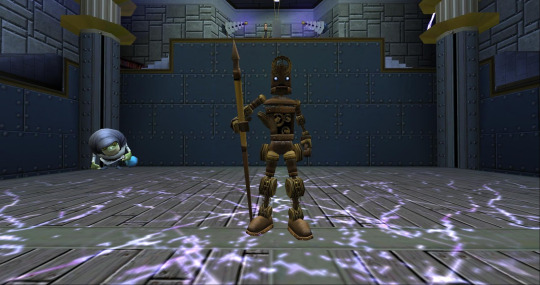
✦ Setting and Lore ✦
Marleybone’s setting is a lot of fun, and I love how much it contrasts Krokotopia. While magic is deeply ingrained in Krokotopia (from the presence of the Balance school down to the colors of the Manders’ scales), Marleybone doesn’t practice magic at all. I like how dark the world is--it’s very fitting for a place that has so much turmoil. I definitely would have liked to see more of a variety in the specific locations though--Hyde Park, Chelsea Court, and Knight’s Court are pretty much the same, not to mention that 99% of the story takes place on rooftops. The lore is alright, but there’s not too much that I find to be super compelling--most of it is just Victorian English stuff + steampunk.
✦ Characters ✦
Sherlock Bones is kind of there, although he doesn’t really solve any interesting mysteries. The concept of Baxter was good--having a “guy on the inside” who could guide the Wizard--but he was a flat character. Meowiarty was probably the most compelling, but he didn’t have much of a presence. I would have liked the world to have much more of a mystery-based plot (as in, actual mysteries) that was focused on working with Sherlock Bones, Watson, and Baxter to find/stop Meowiarty and Malistaire.
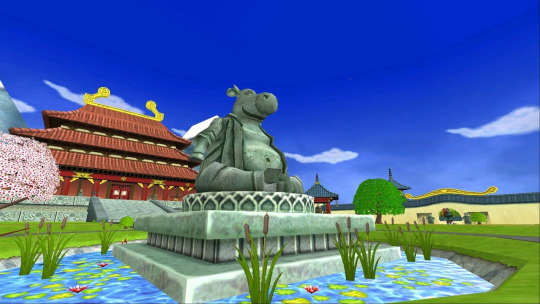
.·:·.✧ MooShu ~ F+ ✧.·:·.
✦ Plotline ✦
MooShu has always bothered me a lot, because it has little direct connection to the overarching story. Malistaire comes here, steals the Spiral Key from the Emperor, and then leaves before the Wizard even gets there. The Jade Champion was able to get the Spiral Key back right as Malistaire went through the door, but he did not give it to the Wizard because the Emperor must be the one to give it to us for some reason. Still, I really liked the concept of the different Onis affecting each area in different ways.
The side quests are… fine, I guess, although I did love the ones centered around the two lost lovers in the Ancient Burial Grounds.
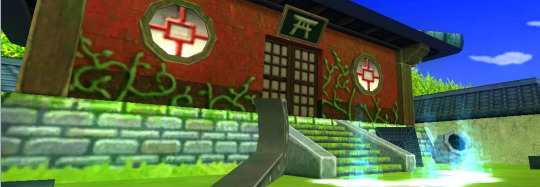
✦ Setting and Lore ✦
This is the first W101 world that stands out as being, uhhhhh,,,, NOT super PC. The accents, stereotypes, and blending of different Asian cultures is not a great look. If we’re able to look past that (which we shouldn’t), I honestly don’t really like look or aesthetic. There’s just a whole lot of brown and a whole lot of bamboo. Pirate101 MooShu is leagues better visually (although it has the same problems with reeeeeally problematic language and characters). I do like a lot of the lore though, especially concerning demons, the Spirit World, and religion. But yeah, I do wish that the setting had more relevance to the story as well. Malistaire wants an ancient magical text from Krokotopia--Krokotopia as a setting makes sense. The ancient text gets stolen by an England analogue and put in a museum--Marleybone as a setting makes sense. The Dragonspyre Spiral Key is kept in MooShu just for fun, I guess. We learn later that the Emperor of MooShu is a member of the Council of Light, so I guess it would make sense for him to have it, but they literally could have made him the Emperor of a world based on anything else and it wouldn’t have changed anything in the main, overarching plot.
✦ Characters ✦
The characters sure do give you quests! They’re really good at telling you how to progress in the game. They absolutely tell you where to go to get XP.
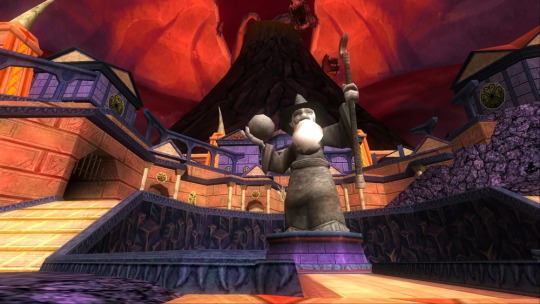
.·:·.✧ Dragonspyre ~ B- ✧.·:·.
✦ Plotline ✦
Dragonspyre’s plot definitely needed some work, as well. When we get there, we learn that Malistaire is in the process of summoning the Dragon Titan in the Headmaster’s Office, but the Wizard can’t get there until they can become a student at Dragonspyre Academy. So we, again, aren’t actively working against Malistaire, because he’s literally static the whole time--the Spiral would be screwed if the ritual took like five minutes.
Despite that, some of the subplots in the different areas were pretty fun: going into the past to see the start of its end, learning lessons from its history in the Crucible, and hatching and raising a Drake (whom we never see again, which sucks).
Like with MooShu, it would have been a lot more impactful to be actively fighting against Malistaire the whole time. In the other worlds, part of the tension comes from Malistaire’s minions attacking innocents. In Dragonspyre, the tension isn’t there because they’re all already dead. Still, if they had focused on this aspect (i.e., the Wizard is the only living person in a world full of ghosts and Malistaire’s minions), it could have been really impactful.
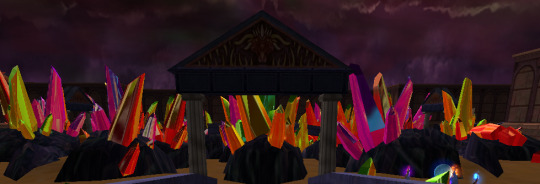
✦ Setting and Lore ✦
I love the premise of this world: a ruined city that was destroyed by a horrible, ancient power due to the hubris of its elite. Dragonspyre has one of the most in-depth histories out of all the worlds of the Spiral, and I love the blending of the cultures of ancient Rome/Pompeii and Russia + dragons. Plus, Dragonspyre Academy darkly mirrors what Ravenwood could become if Malistaire successfully summoned the Dragon Titan.
However, similar to Marleybone, all of the different areas have the same buildings, color palette, and mood. I like the additions of areas that are based on ancient Roman structures (the Basilica, the Necropolis, the Forum, etc,), but it doesn’t really matter because they all look the same.
✦ Characters ✦
Cyrus Drake is one of my favorite W101 characters. His character arc is really good, especially if you play as a Myth wizard. He’s tough on the Wizard at first, but I honestly think it’s because he doesn’t think this Literal Child should be sent to defeat Malistaire.
Malistaire is alright as a villain, and I’m certainly glad he wasn’t a generic evil guy who wants to rule/destroy the world just cuz. I would have wanted him to have just a little something extra, though?? Morganthe is a necromancer who was once a student just like the Wizard, but her mind shattered after the Spider Magi showed her how to touch Shadows. Old Cobb is an elder god who wanted to end the Spiral and recreate it. Malistaire is… an old professor who wants to bring his wife back. I do like how it’s unique, but I would want there to be something more.
Besides them, the characters in Dragonspyre are once again very flat, although I am very gay for the Russian-accent soldier ladies.
═══*.·:·.✧ ✦ ✧.·:·.*═══
Before writing this, I probably would have said that arc one was my favorite. Looking back, it has soooo many problems--writing isn’t exactly one of KI’s strong points lmao. I think that Wiz has some very creative ideas and premises, but sometimes the execution just isn’t the best. I definitely think that a lot of these problems were a result of crunch time, though. If they were actually given time to flesh out their ideas, I think that the game would have turned out much better in terms of storytelling and design.
I’m thinking about making reviews for arc two and three, as I’d be really curious to see how they’d compare. They all have different strengths and different problems. Still, this game has been my favorite game since I was eleven, and it’s something that I will always come back to.
Image Sources
https://101universe.fandom.com/wiki/Wizard_City?file=Ravenwood.jpg
https://101universe.fandom.com/wiki/Krokotopia?file=Tumblr_n1e872SXlZ1tsc4dmo2_r1_540.jpg
https://www.swordroll.com/2013/05/Pirate101-Krokotopia.html
https://www.mmorpg.com/columns/wizard101-abigail-doolittle-is-the-true-villain-2000108162
http://www.edwardlifegem.com/2018/11/wizard101-questing-where-we-ended-up_14.html
https://www.youtube.com/watch?v=_hGd5cDTxd0
https://finalbastion.com/wizard101-guides/w101-pet-guides/pets-dropped-mooshu-wizard101/
https://101universe.fandom.com/wiki/Dragonspyre_Academy?file=Dragonspyre_Academy.jpg
http://www.wizard101central.com/wiki/File:(Location)_The_Crystal_Grove.png#axzz6a4BqFgfv
12 notes
·
View notes